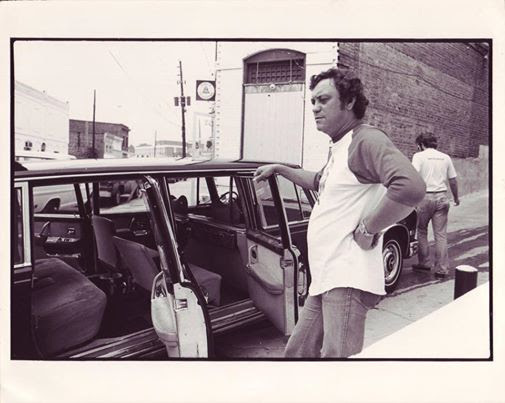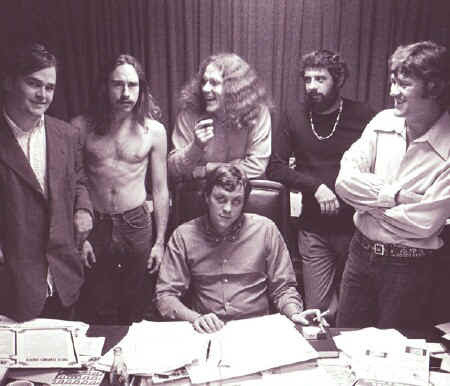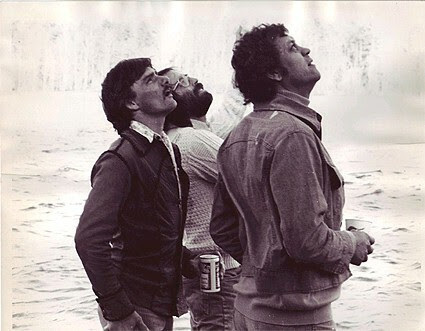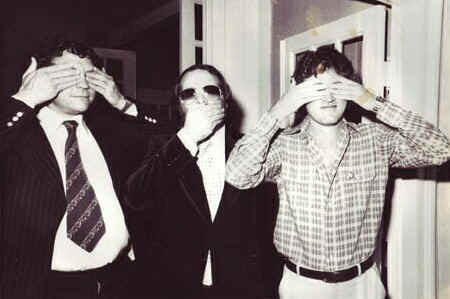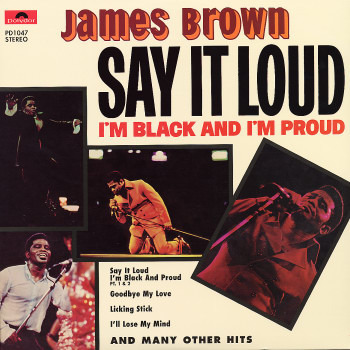Alan Paul's Blog, page 32
October 14, 2014
Neil Young on Howard Stern
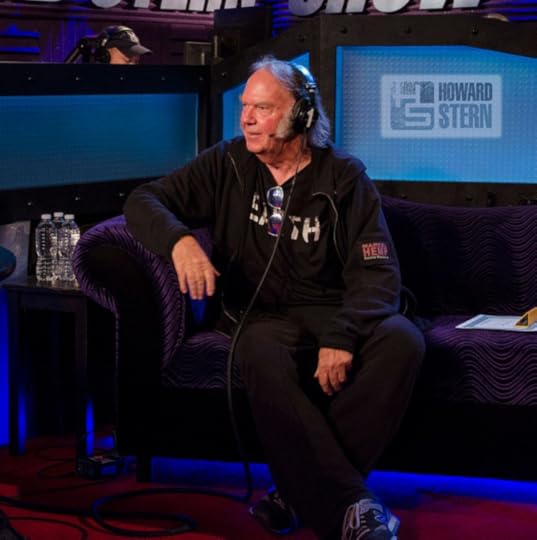
Neil Young visited Howard Stern for an interview this morning. They covered a lot of ground, including why he thinks Buffalo Springfield’s music didn’t translate well to record, the act and art of songwriting, bad reviews, and Crosby, Stills, Nash and Young. Young doesn’t even want to mention David Crosby by name. When Stern asks if it would break his spirit to tour with CSNY again, Young replies, “It would never happen, so it’s nothing to worry about… Why get together to celebrate how great we were?
…”When you play music, you have to come from a certain place and everything has to be clear. I don’t want to disturb that. The love has to be there.”
Amazingly, it is also revealed that he can’t tune a guitar. NEIL YOUNG CAN NOT TUNE A FUCKIN’ GUITAR. That’s crazy.
Listen to the entire 75-minute interview below.
Commentary on this from Bob Lefsetz:
What an original!
We’ve been told that selling out is a choice. But the truth is Neil Young is just wired different. You can’t emulate him, because you’re not him.
This interview was very slow to get going. Because Neil was reluctant. And he was mimicking his hero Bob Dylan, refusing to explain his songs and obfuscating in interviews. But then Neil started revealing his choices and they were so different from everybody else’s that you couldn’t help but marvel.
Like being pissed at the cameramen at Woodstock, to the point of yelling for him to get off the stage, the result being Neil’s absence from the movie. But he didn’t care.
And this is fascinating, because dedicated Stern listeners know that Leslie West believes his career cratered as a result of not being in the flick, that his manager’s decision for Mountain not to be in the movie hurt him forevermore.
But then there was the refusal to be on the “Tonight Show” with Buffalo Springfield because it wasn’t their audience. Can you imagine that today? Someone refusing to do press because the audience might not be right? Ever since the Police the goal is world domination, and if you’re not interested, I’m gonna beat you over the head and convince you.
And then the refusal to get back together with CS&N. Sure, he’s got a feud with Crosby, but even more interesting was the lack of motivation. Howard talked about the fans, Neil didn’t care about the fans, he cared about the music, to go play the greatest hits so people could hear them and everybody could make money held no interest.
And then Neil unloaded on AGT. He repeated it a few times, wondered why Howard Stern did the show.
And that’s when the gap was fully evident. Neil Young was refusing to play the game. He wasn’t gonna come on and reveal all his warts and make like they’re all friends just to sell his latest forgettable product.
And let’s be clear, that is why he was on, to flog Pono and his book and his album, which is kind of sad, I’d be more impressed if Neil dropped by with nothing to sell, but in these moments the divide between broadcaster and talent, between talker and singer, between performer and artist, could not have been more evident. Neil Young was gonna be himself, he could only be himself, and it made Howard and his show look small.
That’s how it used to be, when musicians were giants who walked the earth towering over all other media. Before the best and the brightest went into tech and all we got was an endless parade of yes people willing to bend over to get reamed by not only the industry but the corporations. Who can believe in people like that?
And sure, there was some detailing of how the songs came together, but to say this interview was great would be to overestimate it. At the end it finally flew, Neil relaxed, didn’t deny he was dating Daryl Hannah, said he loved to paddle board, but this was not a morning in the clubhouse so much as a glimpse into the mind of an artist.
Who lives in his own head and doesn’t follow the charts and has no idea of this popular culture of which you speak because he’s doing his own thing.
And I don’t agree with all of Neil’s choices, nor do I think much of his recent material is genius. Then again, even he thinks he’s repeating himself.
But you don’t often get a chance to peek into the brain of an original artist who impacted the culture and is still here, with his faculties intact, not retired, but continuing to push the envelope.
I implore everybody making music to listen to this interview. Not because it’s great, because, as I stated above, it’s not, but because it illustrates you’ve got choices.
You don’t have to write hits.
You don’t have to listen to your label.
Your manager’s job is to free you up, to respect your wishes, to allow you time to create.
We’re so far from the garden I doubt we can ever get back.
There will always be music.
But that does not mean it will be art.
Art requires artists. Who question. Who take chances. Who hew to the vibrations of their own inner tuning fork, who we pay attention to because of their strength in following their vision, in continuing to search without compromise.
Whew. It was definitely Neil.
But he was definitely not like anybody else.
October 3, 2014
The Making of Texas Flood
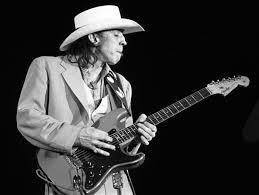
SRV, by Kirk West – www.kirkwestphotography.com
In honor of Stevie Ray Vaughan’s 60th birthday, I present the following story of the making of Texas Flood. This was written for and originally published in Mojo circa 2001. A new version of the album was released last year: Texas Flood (30th Anniversary Collection).
When Stevie Ray Vaughan and Double Trouble were booked to play the 1982 Montreux Jazz Festival, it seemed that years of gigging and hard work had paid off. At last, the Texans who had spent years touring in a milk truck that leaked oil had gotten their break, becoming the first unsigned act to play the prestigious fest. It was a long way from the small clubs the trio played back home in Austin.
The booking came about thanks to the intervention of music industry big wig Jerry Wexler, who saw Vaughan and DT perform at a record release party for their former bandmate, singer Lou Ann Barton, and pledged to help. True to his word, Wexler had called his friend Claude Nobs, the Montreux promoter and helped secure them a slot. Vaughan and Double Trouble appeared on July 17, 1982, at the Montreux Casino amidst an evening of acoustic blues and the audience was less than impressed with their fiery, rocked-up show. Vaughan opened with Freddie King’s instrumental “Hide Away” and tore thorough staples-to-be like “Pride and Joy, “Texas Flood” and “Dirty Pool.”
Any blues fan today would give their eye’s tooth to witness this show. But the Montreux crowd, not expecting such a blistering assault on their evening and perhaps put off by Vaughan’s unabashed swagger and the simple fact that he was white, was les than enthusiastic. In fact, a good portion of the people present booed while the rest were oddly silent. The show can be seen in its entirety on the two-DVD set, Live At Montreux, 1982 & 1985 (which also includes the band’s triumphant return three years later, as superstars). Watching it now, it is impossible to fathom what the audience was thinking in their tepid-at-best reaction. It is not, however, hard to imagine the crushing disappointment Vaughan must have felt.
“Stevie was broken-hearted,” recalls bassist Tommy Shannon. “He turned around and said, ‘I don’t think we sounded that bad.’”
Adds drummer Chris Layton, “After the show we felt depressed and bewildered. We had come so far with such high expectations and the response was so bad.”
 Photographer Darryl Pitt recalls rushing backstage to console Vaughan, only to find him slumped on a small road case, looking like he had “been hit by a sledgehammer.” The dejection did not last long, however. The band was sitting glumly around its tiny dressing room when a Festival employee stopped by and said that David Bowie was in the house and wanted to meet them all.
Photographer Darryl Pitt recalls rushing backstage to console Vaughan, only to find him slumped on a small road case, looking like he had “been hit by a sledgehammer.” The dejection did not last long, however. The band was sitting glumly around its tiny dressing room when a Festival employee stopped by and said that David Bowie was in the house and wanted to meet them all.
“We sort of went, ‘David Bowie who?’” recalls Layton with a laugh. “And the guy said, ‘You know, David Bowie.’”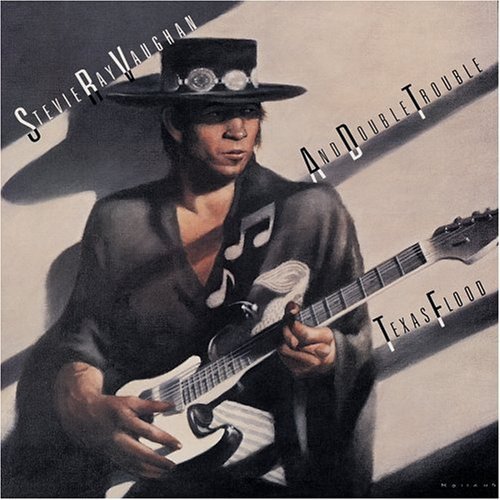
Vaughan, Layton and Shannon headed for the Musician’s Bar downstairs, where they hung out and chatted with Bowie for hours. Vaughan was, of course, delighted with the attentions of Bowie, who would soon proclaim the Texan the best urban blues player he’d ever heard and proclaim that no guitar player had juiced him up so much since he saw Jeff Beck in the early 60s at a London club. But Bowie, too, was pleased that the guitar firebrand was paying so much attention to him. On the heels of Low, Heroes and Scary Monsters, Bowie was regarded as a rather fringe artist in America at the time. So it was that when the rock star asked the unknown guitar stud whether he would be interested in doing some recording, the singer was just as pleasantly surprised that the guitarist said yes as the guitarist was that the offer was made.
“I expected and would have understood a polite ‘Thanks but no thanks,’” Bowie writes in the liner notes for the Montreux DVD. “You can’t imagine how delighted I was when he accepted the offer on the spot and said he’d love to try out a new kind of record just for the experience.”
The following night, Vaughan and company were booked to play the same hotel bar. Jackson Browne, who had performed at the Fest earlier that night was doing an interview in his hotel room when several members of his band barged in bubbling with excitement, insisting that whatever Browne was doing, he had to stop it and get down to the bar right now. Following his bandmates downstairs, Browne was similarly awed by what he witnessed and soon climbed on stage.
Recalls Layton. “We played all night, with Jackson and his whole band sitting in. We jammed until seven a.m., and at the end of the night Jackson said that he had a studio in L.A. and we were welcome any time we wanted to come record some tracks free of charge.”
Over the next six months, the meetings with Browne and Bowie would launch the career of Vaughan and Double Trouble and change the course of blues guitar, bu that was far from clear when the band returned to Austin. They were poorer than a church mouse and their immediate prospects didn’t seem any more promising than they had for the past few years. Vaughan decided to take Browne up on his offer. The singer agreed to give the group 72 hours in Down Town over Thanksgiving weekend, 198, and they quickly booked a short tour to help cover their travel expenses. While most of the studio staff wanted nothing to do with helping some raggedy assed unknowns over a long holiday weekend, engineer Greg Ladanyi offered his services.
“We went in there, just hoping hoped that maybe we were making a demo that would actually be listened to by a real record company,” says Layton.
They were, in fact, recording their debut album, Texas Flood, though the circumstances hewed much more closely to their demo ideas.
“Down Town really was just a big warehouse with concrete floors and some rugs thrown down,” says Shannon. “We found a little corner, set up in a circle looking at and listening to each other and played like a live band.”
“We just rolled in there like it was a rehearsal or something and the guys working there were mildly annoyed because it was Thanksgiving weekend and they wanted to be home,” says Layton. “We were so unprepared, we were like, ‘Hey, uh, you guys got any tape?’”
Ladanyi offered up some used tape to record over, including some of the demos for Browne’s not-yet-released album Lawyers in Love. The trio basically just ran through a typical live set of their strongest tunes. Ladanyi was not interested in getting too deeply involved and the band was unsatisfied with their sound throughout the first day. Richard Mullen, a Texas musician and friend of the band who had been coming to their shows and running sound gratis, happened to be in town, recording with singer Christopher Cross. Not wanting to ruffle any feathers and grateful for the free time, Vaughan had not pushed when Browne and Ladanyi balked at having an outsider behind the console, but by the time they broke for dinner on the first night, the guitarist was vocally upset with his mates about the results. Mullen replied by urging the shy frontman to exert his will, saying in essence, “This is your shot and your show and if you want anything to be different, you have to speak up.”
Returning to the studio newly emboldened, they found that Ladanyi had left. In his place was an assistant, who did not think his job involved more than “pushing the stop and record and buttons.” So Mullen took over, tuned the drums and dialed up the sounds he wanted to hear on Vaughan and Shannon’s amps. He also employed some sound baffles between the players to decrease leakage and allow cleaner tracks of each instrument without forcing the band to physically separate and lose their live vibe. From then on, the band rolled through their repertoire, recording two songs that night and eight the following day. There is some dispute about whether Mullen appeared at the end of the first day or the beginning of the second and whether the whole session lasted two or three days. In any case, they definitely did record seven of the album’s eventual 10 tracks on a single day, November 24, 1982, when they also cut “Tin Pan Alley,” a blues classic that was an SRV standard and which appears on Sony’s 1999 remastered version of Texas Flood. Vaughan cut only scratch vocals, adding only these tracks back at Mullen’s Austin studio.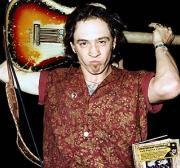
“That whole recording was just so pure; the whole experience couldn’t have been more innocent or naïve,” says Layton. “We were just playing. If we had known what was going to happen with it all, we might have screwed up. But we just went in there and did our live show. The magic was there and it came through on the tape.
“It’s funny, too, because people tell me all the time how much they love Stevie’s tone on that album and ask how he got it. It was so simple it’s ridiculous; he plugged his Strat into ‘Mother Dumble,’ a Dumble amp that Jackson owned and we found in the studio.”
THE ORIGINAL “TEXAS FLOOD” BY LARRY DAVIS:
Vaughan’s hard-edged, vintage sound would soon turn the guitar world’s perception of tone on its head. At the time, rock music seemed eager to leave the past behind. Indeed, many thought guitars passé, with futurists proclaiming that the instrument would be permanently transformed by MIDI applications and replaced as rock’s dominant instrument by the synthesizer. Even many guitar loyalists thought the classic sounds were no longer adequate, transforming their instruments by running them through racks of elaborate, high-tech gear to create heavily processed sounds. Odd-shaped, brightly colored axes were all the rage.
Vaughan’s gear throughout his career was profoundly old school and never more so than on Texas Flood. Eventually, the tones he coaxed from his old but timeless gear would ignite a vintage craze that rages to this day and also launch a new market for small, high-end boutique amplifiers that replicated classic sounds with modern conveniences.
Following the recording sessions, the group stayed in LA to play several dates. On one of these nights, Layton was awakened at the Oakland Gardens Hotel by a three am phone call. “I answered in a fog and it was a guy with an English accent asking for Stevie,” Layton recalls. “I said that he was sleeping and asked who was calling. He goes, ‘It’s David Bowie and I’d like to speak to him now if possible. I got Stevie up and Bowie asked him if he wanted to come to New York and cut some tracks.”
Vaughan accepted the offer and flew to New York in the third week of December to join Bowie and producer Nile Rodgers at the Power Studio. Let’s Dance was complete except for lead guitar tracks. Vaughan’s performances, Bowie has said, “ripped up everything everyone thought about dance records.” Vaughan had casually become the linchpin in birthing a sound that Bowie had long heard in his head – a new kind of dance music that combined Euro sensibility with raw American blues power. Blown away, Bowie quickly asked Vaughan to join his touring band and the offer was accepted, though not without some real angst about leaving behind his own group.
“Stevie‘s plan was to do it for a year, take the money and pay us to keep the band together,” Shannon says.
As rehearsals continued in Dallas, then New York, Bowie and his band grew increasingly excited about the sound they were crafting around Vaughan’s blistering lead work and anticipation rose for bringing this heady brew around the world.. It was not to be, however.
What happened next is not entirely clear. Bowie says that as the band was literally loading onto a bus to go to the airport and fly to Europe and commence touring, Vaughan’s manager demanded a much higher salary or else the guitarist would not tour. The offer was promptly rejected, leaving the guitarist and his bags stranded on the sidewalk as the bus pulled away without him. Layton and Shannon have different recollections of the event. They say that Vaughan, already uncomfortable in a sideman’s role and upset that several promises about opening some shows himself were broken, finally snapped when told that he couldn’t mention his own band or music in interviews.
“He just couldn’t do it because it wasn’t what he loved playing,” Shannon says. “He liked David and his music, but it wasn’t where he was headed and Stevie could not do what he didn’t love.”
Whatever the exact circumstances, Vaughan most definitely did quit Bowie on the eve of a huge world tour to return to Double Trouble and their oil-leaking milk truck.
“I really wasn’t surprised when Stevie quit, but I sure was happy,” recalls Layton. “I couldn’t believe that just when we seemed to have all this momentum, Stevie was going to be gone for at least a year, maybe more. We really thought it might be over, right when we had worked so hard to get to that point, where it seemed like something was going to happen.”
Something was, in fact, already happening. Urged on by Layton and Shannon, who were feeling increasingly desperate that their moment was passing, manager Chesley Millikin had been shopping the 10-song tape made at Browne’s studio and found an admirer in John Hammond. The septuagenarian A&R man, whose discoveries and signings included Billie Holliday, Bob Dylan and Bruce Springsteen, took the tapes to Epic and essentially demanded they sign him. Just like that, and with little other label interest, Vaughan quickly had a deal with Epic Records.
“Epic wanted to release our demo right away and we got more attention because people wanted to know who this unknown guy who told David Bowie to take a hike was,” says Layton.
Vaughan’s pungent playing on Let’s Dance, redolent of Albert King, garnered attention as well, from fans and fellow musicians alike.
“I was driving and ‘Let’s Dance’ came on the radio,” recalls Eric Clapton. “I stopped my car and said, ‘I have to know who this guitar player is today. Not tomorrow, but today.’ That has only happened to me three or four times ever, and probably not for anyone in between Duane Allman and Stevie.”
With Hammond on board as Executive Producer, Vaughan cut new vocals for “I’m Cryin’” before the album was mixed at New York’s Media Sound and released on June 13, 1983.
“We started touring behind Texas Flood and we could feel things changing, the crowds slowly getting bigger and bigger,” says Shannon. “Then we got rid of the milk truck and got a bus and we were in heaven — even though it was a really shitty bus.”
Adds Layton, “We toured the whole country, playing every night, selling out 500 seat clubs, with 200 people standing outside trying to get in. We could feel this incredible momentum building.”
“What really brought it all home for me was when we played at the Palace in Hollywood,” adds Shannon. “We had played there before to mediocre crowds and this time there was a line stretching down the street and around the corner.” (Three songs from the September 23, 1983, performance at the Palace are featured on the remastered Texas Flood.)
Proof that Vaughan was entering the music mainstream came when the album was nominated for two Grammys: Best Traditional Blues Recording and Best Rock Instrumental Performance (for “Rude Mood”). The band also appeared on the Austin City Limits television show and Vaughan won three categories in Guitar Player magazine’s Readers Poll: “Best New Talent”, “Best Blues Album”, and “Best Electric Blues Guitarist,” an award he would win every year until his death. MTV was still fairly new and quite wide open and they began playing the video for “Pride and Joy.” In retrospect, given the strength of the album, all this success seems obvious, but in 1983, it was anything but. A reasonable betting man would have wagered his house that Vaughan and his old school blues-rock trio would fail to register on the popular culture’s radar screen. But the 29-year-old guitar firebrand was clearly playing by his own set of rules. “He was a leader, not a follower,” notes B.B. King “and you didn’t have to be a guitar expert to know that.”
Texas Flood blew open the locked doors of popular music and proclaimed that blues could be a potent commercial force. The album, combined with the runaway success of Let’s Dance, not only put the unknown Texan on the map but also signaled that uncompromised, from-the-gut guitar music was not dead as a commercial and artistic force.
“Stevie Ray Vaughan single-handedly brought guitar- and blues-oriented music back to the marketplace,” recalls Dickey Betts, whose Allman Brothers Band were prominent casualties of the era’s anti-roots disease. “He was just so good and strong that he would not be denied. When I heard ‘Pride and Joy’ on the radio, I said ‘Hallelujah.’”
Vaughan’s dramatic arrival not only helped smooth the way for the return of classic blues-oriented rock acts like the Allman Brothers, but it also made the environment more hospitable for his own peers, including The Fabulous Thunderbirds (featuring big brother Jimmie Vaughan), Robert Cray, and Los Lobos, all of whom had hits in the years following Texas Flood. Stevie also shone a bright spotlight back on his original heroes, most of whom had been languishing — overlooked and usually sans record deal. Albert King, Buddy Guy, Lonnie Mack, Hubert Sumlin, Otis Rush and Albert Collins suddenly found themselves once again being hailed as guitar titans, with interest in their music skyrocketing to levels unseen since the white rock audience’s initial discovery of blues in the 1960’s.
Certainly, as he himself pointed out, Vaughan owed a huge debt to these originators, but his music was not simply derivative; he hungrily swallowed his influences, fully digested them and crafted a style uniquely his own. In so doing, he succeeded where countless others had failed — reinventing the blues in a manner both visionary and true to the original material. It was a goal shared by every hippie with a Muddy Waters record but accomplished by precious few.
“Stevie’s playing just flowed,” says B.B. King. “He never had to stop to think. His execution was flawless, and his feel was impeccable. Stevie could play as fast as anyone, but he never lost that feel.”
Adds Bonnie Raitt, a longtime friend of Vaughan’s, “Just when you thought there wasn’t any other way to make this stuff your own, he came along and blew that theory to bits. Soul is an overused word, but the fire and passion with which he invested everything he touched was just astounding, as was the way in which he synthesized his influences and turned them into something so fiercely personal.”
The word about Vaughan was out on the blues circuit for years, Raitt adds. Guy, King, Dr. John and others who passed through Austin had long been telling her about this kid who “was just killing it.” With the release of Texas Flood, the rest of the world got hipped as well.
// ]]>
September 27, 2014
Frank Fenter Honored By The Georgia Music Hall Of Fame
Frank Fenter Honored By The Georgia Music Hall Of Fame
Frank Fenter co-founder of Macon’s Capricorn Records
to be inducted into the Georgia Music Hall Of Fame
October 11th, 2014
Frank Fenter was born in South Africa, in 1936. He majored in drama at college in South Africa and planned to pursue an acting career. In 1958 Frank immigrated to London to further his dream.
Music was always a big part of Frank�s life and in London he became involved in the music business, he first booked groups into the music and club scene, then joined Chapell Music Publishing and later Frank headed ARC/Chess Music.
In 1966, Mr. Fenter became Head of Atlantic Records in the United Kingdom and within six months, was at Atlantics� helm for all of Europe. Under his leadership, Frank Fenter helped sign and launch the careers of YES, Led Zeppelin, and King Crimson, making Atlantic the most important US label in promoting British Rock N Roll music to the world.
In 1967, Frank Fenter brought Atlantics’ R & B artists, Otis Redding, Sam and Dave, Eddie Floyd and Carla Thomas to Europe in the renowned �Hit the Road Stax� tour of 1967, which was important in crossing over Otis Redding to a white mainstream audience; it was further helped when Fenter suggested to Atlantic Record�s producer, Tom Dowd, to record the live European tour with the majority of the recordings released to critical and commercial success.
In 1969, Frank Fenter went on to become a co-founder and partner in Capricorn Records, the new label introduced �Southern Rock� and launched the careers of The Allman Brothers Band, Wet Willie, The Marshall Tucker Band and Elvin Bishop among others, into commercial prominence and making Capricorn Records one of the most successful independent record companies in America.
September 22, 2014
A (pretty damn good) interview with Paul Westerbeg
 In honor the Replacements’ recent reunion shows, I present to you this interview with Paul Westerberg. I would have loved to go see them in Queens Friday night, but I had my own gig going on.
In honor the Replacements’ recent reunion shows, I present to you this interview with Paul Westerberg. I would have loved to go see them in Queens Friday night, but I had my own gig going on.
The Replacements were a very important band to me. I saw them in September, 1984, at the late and lamented Joe’s Star Lounge, weeks after arriving in Ann Arbor as a freshman. Per Hoffman – now one of my oldest friends, then a new and exciting acquaintance – told me that his friends were talking endlessly about the Replacements and we had to go. I was sold by the Village Voice quote on the poster which was plastered all around town – something like, “the dream flannel amalgamation of CCR and the Ramones.” Sounded good, and they delivered.
It was my introduction to a whole other world of music, and it helped open my eyes to a burgeoning alternative world. I turned away from most of it and back towards blues and other roots music before long, but the best Replacements music has stuck with me, because I think it transcends its time and genre, and that’s because Paul Westerberg wrote some really great songs.
I consider this 1996 interview with Westerberg something of a lost classic – lost even to me. I was very happy with it at the time, but sort of forgot about it and when I came back across it I was honestly taken aback by how good it is. I’m really pleased to have found it and to have the opportunity to share it again. And I’m proud to have been the one to get Westerberg to tell his secret – he always wanted to be a blues guitarist. I knew there was something different in his music.
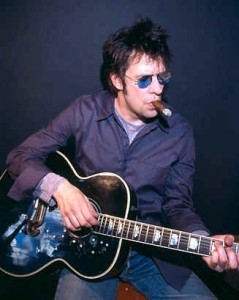 Last spring, Paul Westerberg and Brendan O’Brien entered an Atlanta studio to record Westerberg’s second solo album. Some observors hoped that working with O’Brien, the über-producer who has worked with Stone Temple Pilots, Pearl Jam and the Black Crowes, might bring Westerberg the hit record which has always eluded him. Two weeks later, the former Replacements’ frontman was on a plane home to Minneapolis, with most of the tracks he and O’Brien had worked on left to gather dust.
Last spring, Paul Westerberg and Brendan O’Brien entered an Atlanta studio to record Westerberg’s second solo album. Some observors hoped that working with O’Brien, the über-producer who has worked with Stone Temple Pilots, Pearl Jam and the Black Crowes, might bring Westerberg the hit record which has always eluded him. Two weeks later, the former Replacements’ frontman was on a plane home to Minneapolis, with most of the tracks he and O’Brien had worked on left to gather dust.
“It just wasn’t shaping up to be as good a record as I knew it could be,” Westerberg says. “Sometimes you just have to know when to pack it in and try over.”
Once an iconoclast, always an iconoclast.
Westerberg enlisted Lou Giordano (Goo Goo Dolls, Sugar, Smithereens) to help him finish up. The result is Eventually (Reprise), the title apparently a reference to the three years that have elapsed since his solo debut, 14 Songs (Sire/Reprise). Despite the start and stop recording process, the album sounds spontaneous and fresh. Westerberg is again the sole guitarist, and the instrument comes more to the fore here, with a chiming 12-string on “These Are The Days,” careening fills on “Century,” layers of acoustics and electrics on “Love Untold” and a pretty, liquid-toned lead line on “Once Around The Weekend.”
Some of his rockers now sound formulaic—even he admits, of Eventually ‘s “You’ve Had It With You,” “I’ve written that same song about 15 times now.” But Westerberg’s touch with subtler fare remains deft, as evidenced by acoustic-based gems like “Hide N Seekin,” “Angels Walk,” “Time Flies Tomorrow” and “Good Day,” a moving tribute to Replacements guitarist Bob Stinson, whose 1995 death seemed sadly inevitable.
The strength of the new album’s mellower tunes isn’t really a departure for Westerberg. For, while the Replacements were known for their drunken antics and unpredictable live shows, what actually set them apart in the early-Eighties alternative scene was their knack for balancing careening rockers with Westerberg’s aching, vulnerable ballads. This yin and yang was fully realized on albums like Let It Be (Twin/Tone,1984), Tim (Sire, 1985) and Pleased To Meet Me (Sire, 1987), landmark albums which largely failed to find a larger audience.
But just because the band never became stars doesn’t mean they didn’t leave a mark. Their melding of punk aggression and pop hooks became a touchstone for legions of alternative bands. Kurt Cobain, for one, was a major acolyte, taking much of his frayed flannel vulnerability, as well as the pained, nicotine and vinegar singing, from Westerberg. (He also borrowed the title of Nirvana’s Geffen debut, “Nevermind,” from a Replacements song.) All of which has left Westerberg with a strange niche in the rock world, someone who skipped stardom on the way to becoming a legend. It seems to be enough for him.
“I don’t have anything to prove these days except that I can still make meaningful music,” Westerberg says. “I can’t get hung up about how they’re going to sell anymore. Whatever happens, I’ll just tour for a while, then record another one. That’s what I do.”
GUITAR WORLD: Did you start out intending to be a guitarist or a songwriter?
PAUL WESTERBERG: A guitarist. I spent years sitting in my room listening to stuff with hot guitar players, like Duane Allman or Mick Taylor, trying to learn riffs. I fancied myself a lead guitar player until I was 19. Then I realized I sucked and that being a lead player just wasn’t going to get me where I wanted to go.
GW: Did playing with Bob make you realize that quicker?
WESTERBERG: Not really. When the Replacements asked me to join, it was expressly to be the lead guitarist. Things developed as they did somewhat out of necessity. Bob couldn’t sing a lick and he couldn’t write a song. I knew where to steal from and looked kind of reasonable standing in front of a mic, and we took it from there. Bob became the lead guitarist simply because he could not sing. Nor could Tommy [Stinson, bassist and Bob’s brother], who was 13 and whose voice hadn’t even changed yet. I learned to do what I do because I had to. If I didn’t do it, they would have gotten someone else to do it…and I liked their sister. [laughs]
GW: So it was the Stinsons’ sister that drew you to them?
WESTERBERG: That was a big part of it. I definitely wouldn’t have come back a second time if it wasn’t for her.
GW: Did being a frontperson come naturally to you?
WESTERBERG: Hell, no. It still doesn’t. My knees shake before every performance. It didn’t come naturally at all. I was terrified. I commanded the basement for a long time before we ever confronted an audience. Then it was like starting over again—with people responding to your singing by throwing things at you.
Fear of performing was quickly exchanged for fear of the audience. We were thrust into the punk scene, where if you weren’t good and weren’t sure of yourself, you would literally be physically attacked. So we had to get good real fast. Our survival instinct took over.
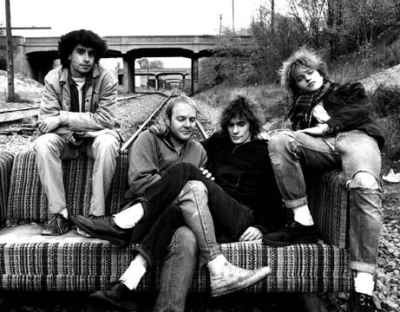 GW: Actually, listening back to Sorry, Ma, Forgot To Take Out The Trash [Twin/Tone, 1981], I was struck by how tight you guys were on your very first album—much more so than the reputation indicates.
GW: Actually, listening back to Sorry, Ma, Forgot To Take Out The Trash [Twin/Tone, 1981], I was struck by how tight you guys were on your very first album—much more so than the reputation indicates.
WESTERBERG: That stemmed from utter fear. We didn’t know what we were doing, and we were really scared of failure. We practiced really, really hard before recording the first album. We learned our parts and we learned complementary parts, and we made sure that everything meshed. It wasn’t until two or three albums later, after we had toured quite a bit, that we realized not everyone cares so much about notes, that your attitude and what you say and wear on stage is a big part of it too. As we learned to put on a show, the meticulousness of the songs and the playing tended to change—or suffer, depending on how you see it.
GW: Did the Replacements’ reputation for inspired drunken mayhem become a trap?
WESTERBERG: Of course it did, though we didn’t realize it at the time. We drank to give us courage and once we had courage we did zany things to make people remember us. And once they remembered us we started to write good songs and play better but it always seemed to be overshadowed by the zany things we did. We just couldn’t up the ante that last time. We didn’t know where to take it because we had created this albatross. That’s why the band broke up—there was nothing left to do.
GW: Why do you think critics liked the Replacements so much?
WESTERBERG: Because we never made it. If we had sold a million records, most of them would have abandoned us real fast. I know that they still like U2, but we didn’t have that kind of integrity or sophistication. We were just a good fuckin’ time. Then we started taking the whole thing seriously and that was the kiss of death.
GW: You guys were very different from the type of acts that a major label was used to working with in 1985. Do you feel that you were sort of put into a slum there?
WESTERBERG: To a certain extent, but to be fair, they did give us a chance with Pleased To Meet Me. But no one really spelled out what was required of us. A few years later bands like Guns N’ Roses promoted themselves on a major label with our style of behavior, but we were still of an era where misbehaving was not something that the label could tolerate or promote. I think they thought we were just pretending to be what we were and what we really wanted to do was sell a million records and live the good life. I think they were kind of shocked when they realized that we were what we were.
GW: Are you saying you didn’t want to sell a lot of records?
WESTERBERG: I’m saying we wanted to do what we were doing. If that sold a million records, wonderful. But they wanted us to change and toe the line and that tore us apart. Each individual band member went through this trauma: “Do we change what we do?” The problem deepened because we began to realize that our behavior had become old hat and we had to change, but we felt trapped that if we did change, it would look like we did it because the label told us to, and we’d lose credibility and everyone would say we sold out. We suffered a lot for that.
GW: That seems somewhat silly now, but at the time, many considered the mere act of signing with a major to be an act of treason.
WESTERBERG: You resent where you’re going because it means you have to leave where you came from behind. I’ve often wondered how our music would have been effected had we never signed to a major label, and I really think it would have gotten slicker quicker. I think if anything we tried to keep it as rough as possible for as long as possible because we felt somehow dishonored by being on a major label. I mean, we always loved pure pop music. We would have made that kind of music from day one, had we been capable of it
GW: Did Bob love that stuff, also?
WESTERBERG: Oh sure. You shouldn’t confuse what Bob liked with what he was capable of playing as a guitarist. He was great at playing one style, but he loved lots of other music.
GW: Were your ballads immediately accepted by the others?
WESTERBERG: Rarely was there a song that we all thought was great. There was tension pretty much every day over everything. [laughs] And, yes, as a rule, Bob preferred the high voltage stuff but I knew that sticking to that was going to lead us to a quick end, because we weren’t the best at it. Black Flag, Hüsker Dü and Minor Threat were our contemporaries, whether we wanted them or not, and they did that better than us. There was also R.E.M. I think it was very good for us to see a band that could retain their credibility while playing softer music, but we were more often slugging it out in clubs with genuinely scary rock bands, not writing pretty songs to compare to R.E.M.
GW: There was a time when you and R.E.M. were on equal footing, the two great hopes of bringing underground music aboveground. Have you reflected on that much?
WESTERBERG: Of course. I’ve had to mention them in every interview I’ve done since 1981. The problem is, they don’t have to mention us anymore. You’d think I would learn my lesson and never mention their name again. They simply don’t have to acknowledge us anymore. They won.
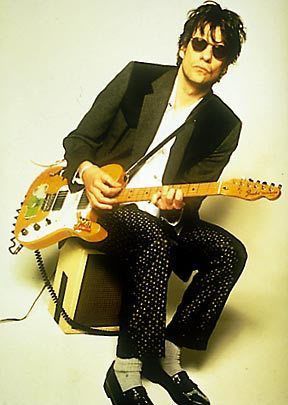 GW: Why have you not used another guitarist on either of your solo albums?
GW: Why have you not used another guitarist on either of your solo albums?
WESTERBERG: I never think that my songs need guitar embellishment. I tend to think of them as simple tunes which can pretty much be carried by the chord structure and vocal melody. If your interest is maintained by a little guitar or horn flavor, great, but I don’t really think that my songwriting generally calls for flashy guitar work. And if it’s not flashy, I can handle it.
GW: You use different tones to create a full guitar sound yourself. Do you utilize different amps to do that?
WESTERBERG: No. Years of performing have taught me to control things from the axe. I’ll just roll off the high end or play with the volume at two or three. I’m not an effects person and I don’t have an arsenal of amps at my disposal, but I am picky about my sound. I don’t like sustain and I don’t like a lot of compression. I prefer a sound that’s right in between dirty and clean and doesn’t have that 10-second sustain when you hit one chord. I’m pretty much lost when the tone gets over-saturated and there’s no distinguishing between one chord and the next. You need to be able to hear me change chords. But I just keep it simple—amp, guitar. Besides, I hate music stores—I never go into them.
GW: Why do you hate music stores so much?
WESTERBERG: They’re just jam packed with guys who don’t have it, guys who spend their lives learning how to play the instrument but don’t have anything that people want: no personality or life about them. I see a lot of bitterness in music stores and I always have. I remember trying to buy a saxophone at the band instrument store and even that place had a total loser vibe. The guy picks up the horn and blows this Coltrane-esque run with me, who can’t play at all, looking for help and getting really pissed. I was like, “Fuck you. I’ll go find one at a garage sale and teach myself.” And I did.
GW: Eventually sounds very organic and relatively raw, so why did it take you three years to record?
WESTERBERG: Most of the songs are essentially live—my parts and the main rhythm parts are live takes. That’s the case for “These Are The Days,” “Once Around The Weekend,” “Trumpet Clip,” “Love Untold” and probably a few others. But sometimes it takes a long time to get a really good first take.
GW: You began to record the album last spring in Atlanta with Brendan O’Brien, then pulled out after a few weeks and only three songs from those sessions ended up on the album. What happened?
WESTERBERG: When you don’t spend a lot of time overdubbing, what you’re really going for is a performance and sometimes you’ve just got to admit, “Hey, I’ve got the wrong mix of people. Maybe I should write some new songs and try it again in six months with someone else.” That’s just what needed to happen. It would not have been as good a record had I finished it all in Atlanta.
GW: Are there any specific songs that benefited from the change?
WESTERBERG: The prime example is “These Are The Days.” Brendan really wanted that song to be a ballad and I felt it had to be rerecorded with more of an uplifting lilt, and I think the results prove I was right. But, look, the sessions with Brendan weren’t a disaster by any means: “Love Untold” is the first single and whatever it took, we got one magic, live take. We thought we were going to make a great record, but it didn’t work out that way. We ended up with one great song and two really good songs. That’s not a bad two weeks.
The producer’s role is at times an unenviable one. If things aren’t going well, he has to make suggestions, but he doesn’t know what’s deep in me. He saw something that wasn’t working and he tried to make it work, but I knew that direction we were taking it was not right.
GW: And I suppose that one of your reasons for going solo was to be able to do things your way without having to run it by other people.
WESTERBERG: [pauses] That’s very astute of you. Sometimes I really miss not having a band because if a song needs tension, it’s hard to provide it by yourself. But I willingly give that up in order to be the final vote on everything I do because I think I know what the feel should be—and I’m the one who has to live with it forever.
GW: This may sound strange, but “Time Flies Tomorrow” has sort of an Allman Brothers vibe.
WESTERBERG: It’s not strange. You’re probably thinking of “Melissa.” I didn’t dodge it sounding like something else, but I thought it was more reminiscent of [The Rolling Stones'] “Moonlight Mile.” I think some of the best songs sound instantly familiar. When you choose to work in the arena of simple chords, what you are basically saying is, “This is a I-IV change. You’ve heard it in a million pop songs, but I’m going to give it to you again with my own lyrics.”
GW: You use several bassists on the album, including yourself. How do you decide when to bring someone in and when to play it yourself?
WESTERBERG: Every once in a while, I want an aggressive bass part, and I can’t do that, but if it’s a loping, folk-pop thing I’ll just do it. A lot of bass players frown on that style, but sometimes you’re better off when you don’t know a lot, and I only play the root note. To me, rock and roll is drums, rhythm guitar and vocals. Lead guitar and bass are almost superfluous if the drummer is great and the rhythm is tight. I’ll usually cut live with the drummer and if there’s a bass player there, I’ll have him take a crack at it. When I listen back, if the drums aren’t doing it for me, I usually blame the bassline and redo it, simplified, myself. The bass playing that I like is minimal, ever-so-slightly behind the beat, and played with the kick drum.
GW: Do you still consider yourself a punk at all?
WESTERBERG: Was I ever or will I ever not be? Somewhere in between lies the answer. I am a musician and an artist, which is something I couldn’t have said back then ’cause we would have been laughed at. We were anti-artists. We were punk rockers, but I think the connotations the word has these days are very predictable and silly. I would be more happy to say I’m a well-rounded adult. That’s much more dangerous than being a punk these days.
GW: Who were your primary guitar influences?
WESTERBERG: The usual suspects from the school of crash and burn guitar playing: Keith Richards, Johnny Ramone and Johnny Thunders. Everything sort of comes from those three, at least in terms of rhythm. Lead-wise I listened to a good deal of blues, anyone from Albert and B.B. King and Eric Clapton to Mick Taylor and Mick Ronson. Plus Neil Young—and Bob, who influenced me a lot.
GW: That may cover the hard rocking stuff, but there is another, very different side to your music as well—the ballads. Who were some of your main songwriting influences in that regard?
WESTERBERG: There’s someone I always think of, but hesitate to say and I’ll just say it: Burt Bacharach [composer of such pop hits as "Raindrops Keep Falling On My Head" and "Do You Know The Way to San Jose"]. My ear has always been pulled to piano chords, which I think is largely what set the Replacements apart; we were a garage band playing at extreme volume, yet I was playing things like sixths and major seventh chords, which immediately made people say, “Well, that’s the Beatles.” Yes, the Beatles used those chords, but so did every other pop songwriter. Top 40 pop radio of my youth was my songwriting guide.
GW: Were you scared to sing ballads when you first started writing them?
WESTERBERG: Yes. And to this day I’m never charged with courage when I write them and, especially, when I present them to the first person. I’m always a little sweaty palmed. I have learned that the ones I am most afraid for anyone to hear are usually the ones that will strike a chord with people. But the fear is real and true—those are also the ones someone will laugh at. You just can’t be afraid of sounding wimpy or of someone pointing a finger and laughing at you.
GW: Your songs tend to be very personal. Have you ever written a song that was just too personal to record?
WESTERBERG: Too shit! [laughs] “Too personal” could be a euphemism for too whiny, too maudlin or too self-centered. I think I’ve reached the point where I know when I cross the line into masturbation.
GW: Why have you never included lyric sheets on an album?
WESTERBERG: Two reasons: growing up, my favorite records never had the words in them, and whenever I see lyrics written out, I always think that a good song doesn’t necessarily make for good poetry. It’s the marriage of melody, lyrics and rhythm that makes a song. And that’s what I do. I don’t write poems.
GW: Do you hear your influence in other bands often?
WESTERBERG: Not often enough. I hear my influence in a whole lot of people who profess to never have heard us, which bothers me a little. It’s fine when people acknowledge where they got it. You’re welcome to anything—borrow, lift, steal it all, as long as you admit it, because I’ve always been honest about where I took things, whether it be Eric Carmen or Hüsker Dü.
GW: The Goo Goo Dolls have always sounded a lot like the Replacements and they had a hit with “Name,” which sounds like one of your outtakes.
WESTERBERG: What can I say? For seven years John Reznick had to talk about me. Now I have to talk about him. The Goo Goo Dolls obviously fall into the category of a band that listened a lot to the Replacements, learned from us and took from us, but have made no bones about it. So they have my blessing.
GW: Have you heard Wilco or Son Volt?
WESTERBERG: Ugh. No comment. I’m always mystified when I hear my own voice on the radio. I never know who it is and it’s really weird when I realize, “Oh my God, this is me.” Well, I’ve thought I heard myself a few times when it’s been them, and that makes me very uncomfortable. They’ll swear up and down that I’m full of shit and they never listened to us. I guess we listened to the same people growing up then.
GW: Legend has it that the Replacements stole your masters from the Twin/Tone offices and threw them into the mighty Mississippi. Is that true?
WESTERBERG: As many as we could carry. [laughs]. I think we took about five reels, and I don’t even know what they were. We thought we were taking outtakes, which we were convinced they were going to release because we had signed with Sire. We didn’t think it was fair for our outtakes to become a record.
GW: Another Replacements legend is that your first gig was at an alcoholic halfway-house. Is that apocryphal?
WESTERBERG: No. That was our first performance, though we didn’t play a note. We were physically ejected from the building for being drunk. All of this stuff that sounds like a bold-faced lie is the truth. The only myth I’ve ever heard was the thing about the vomit dripping off the ceiling in Memphis while we were recording Pleased To Meet Me. Someone made that up.
GW: Has your opinion on videos changed at all since you attacked them in “Seen Your Video” [Let It Be, Twin/Tone, 1984]?
WESTERBERG: I thought I was waving a flag saying, “This is real rock and roll and that isn’t.” I was probably masking my fear of the medium. I no longer fear making a video, but I honestly don’t like them. I never have and I never will. I like film and I understand that a filmmaker has a right to interpret and fulfill his vision, but not on my song. I have given the lyrics all the visual that is necessary. I want people to think of the time they met their girlfriend to this song, or had a fight, or went for a ride, not some guy with no teeth, and a midget dancing with a hot babe.
GW: Do you write on an acoustic?
WESTERBERG: I used to. More and more, I’m writing on piano, then adapting it to acoustic. The melodies are born on piano, then I just play the simpler, nut-position chords on the guitar. The piano helps me sing melodies that I wouldn’t come up with over a G and D chord. I hum up the melodies and adapt them to my basic three chords.
Of course, the rockers, like “You’ve Had It With You” I write on electric guitar. I just tune to an open chord and bang out the riff.
GW: You guys were always associated with Hüsker Dü, but did you ever identify with Prince as a local guy?
WESTERBERG: Sure. We experienced the same weather and a lot of the same things growing up. Minneapolis audiences are mighty reserved, and learning to command an audience in a place where people are notorious for being quiet will either make you a wallflower, quiet artist, or it will make you really boisterous, aggressive or flamboyant, which is what it did for both of us. I really think a lot of his flamboyance came from the suppression of the place that we live. It’s a cold place to live in more ways than one.
GW: A lot of people thought “World Class Fad” [14 Songs] was about Kurt Cobain.
WESTERBERG: I know for a fact that he did. I feel bad that he died, if that’s what you want to know. I feel real bad, because he was a major talent. But more than that, I feel happy that he was born and that he heard the shit that he did.
GW: Did you recognize things in his life and think that his path is one that you or someone on the Replacements could have followed?
WESTERBERG: Yeah. I think the eventual death of Bob illustrates that perfectly. That could have and probably would have happened a lot sooner if we had had a lot of success and become really popular before we developed any semblance of maturity. And he might not have been alone, either. Let’s leave it at that, please. We knew that what happened to Bob was gonna happen one day, which didn’t make it any less shocking or tragic.
GW: What do you think is your greatest strength as a guitarist?
WESTERBERG: My understanding of yet inability to play the blues. I approach my rock and roll or pop music the way someone else would approach blues. I try to keep it as bare, simple and real to life as possible. Because my true desire, my dream in life—which I have never before revealed—is to be the greatest blues guitar player in the world. There, I said it.
GW: I think your description of what you try to do on the guitar could apply to your songwriting as well.
WESTERBERG: Absolutely. A lot of people wouldn’t understand that. They’d say, “But you use more chords and sing songs that sound like the Monkees. That’s not the blues.” Well, that’s like saying the blues always have to be about waking up this morning and feeling bad. That’s not what makes for great blues. It’s the honesty is what it is.
And there’s another thing to be learned from the blues: once you realize that playing guitar is mainly about what kind of shirt and shoes you’re wearing, it all falls into place.
September 16, 2014
Happy Birthday B.B. King: An appreciation and personal history
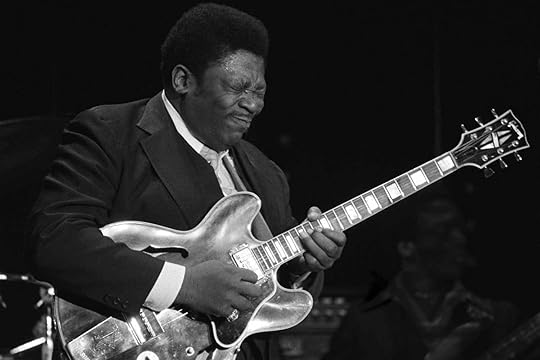
Photo by Kirk West – www.lesbrers.com
B.B. King turns 89 today. Happy birthday Mr. King.
Three years ago, I took my son Jacob, then 13, to see B at the Wellmont Theater in Montclair. I wanted Jacob to see him, and he had a truly memorable experience. When Jacob went up front to take a picture, he was standing right in front, when the great man said, “Hey there, little dude” into the mic, leading everyone to cheer. B.B. then flipped Jacob a guitar pick, which he had to get down and scramble to find on the floor, before returning to our seat with a huge smile.
At 86, B.B. was on something of a valedictory tour. The show was short and he did not play a lot of extended lines, but his voice sounded great, with a strong command of dynamics. His playing was a little shaky at times, and really magnificent at others. The band was excellent, and I really don’t think a single person there was anything other than happy. I feel lucky to have seen B.B. many times over the yeas and they’ve all been different.
The first time I saw B live was in college. He came to the Michigan Theatre and I interviewed him for a preview in the Michigan Daily. I was really excited. The show was just fair. The band was good and B.B. was a great showman and sang really well but he barely played. He ripped off no extended lines, which was a little frustrating. He would play a great lick, and then just stop and start shucking and jiving or let the other guitarist take over.
I thought, “This was cool to see but he’s not so great any more.” Then less than a year later, he was playing the Masonic Temple in Detroit with Albert King and Bobby “Blue” Bland. I went with a few friends. We were in our usual scrubby T-shirts and jeans. The rest of the crowd was almost all older black folk dressed like they were going to church.
All three performers were excellent, if brief. B.B. was totally different than he had been the first time I saw him. He put on a radically different show than I had seen in Ann Arbor. He was charming, funny, but less hammy and he ripped on guitar. It was so cool.
After the show, we were blocked into our parking space. I saw three old ladies get into the car in front of us and start up and I patiently waited for them to leave. They did n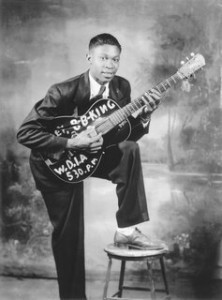 ot do so. I waited some more. Nothing. Not wanting to be rude and honk, I got out and walked up to the window and tapped on it. It rolled down and the three old biddies in church hats were sitting pressed together in the front seat of this Olds 88 passing a big doobie around. The driver rolled down the window and a big cloud of smoke came out, Cheech and Chong style, and I said, “Excuse me, I’m stuck behind you. Could you please pull forward?”
ot do so. I waited some more. Nothing. Not wanting to be rude and honk, I got out and walked up to the window and tapped on it. It rolled down and the three old biddies in church hats were sitting pressed together in the front seat of this Olds 88 passing a big doobie around. The driver rolled down the window and a big cloud of smoke came out, Cheech and Chong style, and I said, “Excuse me, I’m stuck behind you. Could you please pull forward?”
“Sure. Sorry, baby.” Giggles all around.
I saw B.B. again in front of a white crowd a year or so later and he was pretty lame. I thought, “I’m not seeing him again.” About a year later, my friend Skirboll had tickets to B.B. at Pittsburgh’s Heinz Hall and really wanted me to go with him. Ok, fine. I went, mostly to have a good hang with Skirbs, who was really excited to see B.B. Heinz Hall is the home of the Pittsburgh Symphony and B.B. rocked. He was again totally different than the first time I had seen him. He played extended lines, he was surprising and passionate in his playing and not hamming it up as much. It was really cool.
That had to be 20 years ago, so he was at least 65, and he was clearly undergoing a renaissance. It was shortly after he recorded “When Love Comes to Town” with U2 and I think that really had something to do with re-inspiring him, by again bringing him a new, younger crowd.
Since then, I’ve seen him many more times in different settings and while always a little different, and while he began mostly sitting down about a decade ago, the playing has mostly gotten more and more inspired. I have seen him fiddle with distortion, play jazz, do cool comping behind his pianist and guitarists. It is really astounding how he kept pushing at that stage of the game. That era seems to be over, but the new one, of him taking a victory lap of the nation on his endless tour, is kind of cool as well., though thre years have passed and I’ve heard some pretty scary reports.
In any case, definitely worth taking a moment to apy tribute to why B.B. matters in the first place.
// ]]>
Amazon.com Widgets
I wrote the following almost 20 years ago when B.B. debuted a column with Guitar World. This was the intro to the first one.
Life of Riley
A brief history of the King of the Blues, Riley B. King, aka B.B.
By Alan Paul
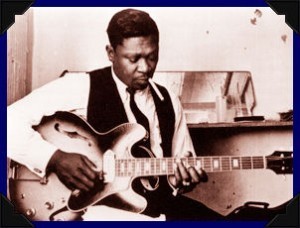 He’s known as the King of the Blues, and one reason may be that B.B. King remains the only black blues artist to have successfully penetrated the thick walls of American popular culture. He is the only one to step inside from the commercial cold that has long been the bluesman’s fate, to receive presidential citations and honorary degrees, to star in commercials for everything from McDonald’s to Northwest Airlines and to become an international ambassador of both good music and good vibes. He has become so omnipresent that it’s easy to forget why he’s so revered: he is the man who fundamentally changed the way the electric guitar is played.
He’s known as the King of the Blues, and one reason may be that B.B. King remains the only black blues artist to have successfully penetrated the thick walls of American popular culture. He is the only one to step inside from the commercial cold that has long been the bluesman’s fate, to receive presidential citations and honorary degrees, to star in commercials for everything from McDonald’s to Northwest Airlines and to become an international ambassador of both good music and good vibes. He has become so omnipresent that it’s easy to forget why he’s so revered: he is the man who fundamentally changed the way the electric guitar is played.
“None of us would be here today if it weren’t for B.B.,” says Buddy Guy. “He changed the way all of us squeeze the strings.” Guy should know; his pumped-up, wildly frenetic guitar style owes its heart and soul to King’s far more sedate approach. It is safe to say, in fact, that every blues-based electric guitarist on the planet owes a huge debt to B.B. King, whether they know it or not.
King took single-string electric lead guitar playing, pioneered by jazz pioneer Charlie Christian and sophisticated Texan bluesman T-Bone Walker, added elements of acoustic blues greats Lonnie Johnson and Blind Lemon Jefferson and the fiery gypsy jazz of Django Reinhardt and emerged with the highly personalized B.B. King sound: stinging finger vibrato, economical, vocal-like phrasing, and heavenly bending. This style strongly influenced every electric blues guitarist to follow, including Guy, Albert King, Freddie King and Otis Rush. These players, in turn, inspired countless rock guitarists, notably Jimi Hendrix, Eric Clapton and Stevie Ray Vaughan. The rest, as they say, is history.
A good place to experience King’s groundbreaking style is The Best Of B.B. King, Volume One (Flair/Virgin), an essential collection which includes his original versions of standard-bearers like “Three O’Clock Blues,” “You Upset Me Baby” and “Five Long Years.” On these tracks, recorded in the 50s, the core elements of B.B.’s sound are already developed, with his distinctive single-note leads playing call-and-response with his powerful, gospel-heavy voice and a punchy, sophisticated horn section.
Ironically, the most signature feature of King’s playing—that remarkable, utterly distinct vibrato—came about because of a personal failure. As a young guitarist, Riley King could not master slide guitar, the style of choice in his native Mississippi Delta. Instead, he learned to mimic the whining, lyrical slide tone of Delta masters like his uncle Bukka White and Robert Nighthawk by using his hands alone – specifically by developing his vibrato, which he achieved by shaking his finger perpendicular to the neck.
“I always loved the sound of slide players,” King explains. “I’ve never been able to play slide myself, but I found that when I trill my hand I can fool my ears into thinking it’s a person using a slide.”
King augments his beautiful vibrato with a remarkably lyrical sense of phrasing and an innate ability to use each note to maximum effect—of not overplaying.
“When you’re a soloist you don’t play a note just because you can find one,” he says, matter-of-factly. “You do it because it makes sense. Every note is important. If it can be done well with less, then do that. Another reason that I don’t play a lot of notes is I feel that I’m still singing when I play. When I’m playing a solo, I hear me singing through the guitar.”
B.B.’s vocal-like guitar playing is part and parcel of his rare ability to communicate intimately with an audience, to make any size auditorium seem like a small room and every listener feel as if he’s playing just for them. It’s a skill that draws the crowd in, making them feel like a part of the proceedings. This powerful rapport is perfectly captured on Live At The Regal (MCA), a document of a 1964 performance which is considered by many to be not only his finest recording, but the greatest album in all modern blues. This treasure-trove of sophisticated-yet-down-home music includes such staples as “It’s My Own Fault,” “Every Day I Have The Blues” and “Sweet Little Angel.”
By all means buy this album, but don’t forget that the real way to experience B.B.’s power is to go see the man for yourself. You won’t be disappointed. Perhaps the most impressive thing about B.B. King is that he continues to push himself hard, to try new things and stretch out his playing. This can be heard on fine albums like the star-studded Blues Summit (1993) and his last new release, the excellent Blues on the Bayou (1997), but the stage remains B.B.’s real pulpit. He can still swoop up entire audiences into the palm of his hand and hold them rapt with a single mellifluous run. Most remarkably, at age 74, after over 50 years in the business, he never seems to get bored, never takes anything for granted or rests on his laurels for even one night. How many other legends can make the same claim? Long live the King.
September 4, 2014
The time I interviewed James Brown about Say It Loud and I’m Black and I’m Proud
In 1999, Guitar World devoted an entire issue to the 30th anniversary of 1969, which we proclaimed the greatest year in rock. I wrote the histories of several landmark albums, including James Brown’s Say It Loud (I’m Black And I’m Proud). The best part of the entire project by a long shot was interviewing the great man himself. I am still searching for the interview tape, but the whole thing was a classic.
This seemed like an excellent time to revisit, what with the current run of the great biopic Get On Up.
Note how entirely ungracious he was towards Jimmy Nolen, his longtime collaborator and the man who really wrote the book on funk guitar. Brutal. I was trying to spoonfeed him questions that would lead to him proclaiming Nolen’s greatness, but he was having none of it.
*
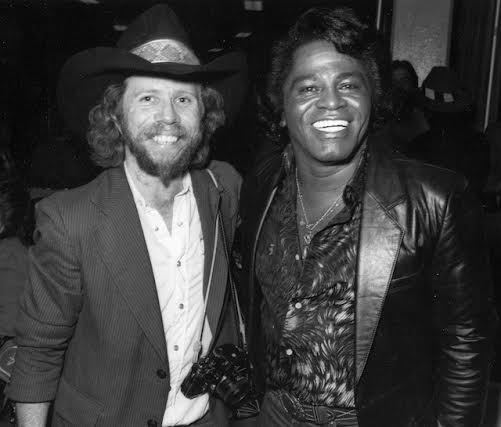
Random photo of Kirk West and the Godfather.
When James Brown released the single “Say It Loud (I’m Black and I’m Proud)” in late ‘68, he was an artist on a roll, with a huge and expanding audience, both black and white, and a steady diet of hits on both the pop and r&b charts. But “Say It Loud,” interpreted by many white listeners as an angry rebuff, was to be his final pop hit.
Today, Brown says that anyone who viewed the song as an angry anthem was way off base. “I was trying to do two things,” says Brown, who recently released I’m Back (Private Music). “One, give the power structure –which in America means the white power structure – a way to understand how we felt, and know that we had people who could do things and just wanted a fair shake. Two, I wanted young black kids to wake up and realize that they should be proud of who they were, get an education and try to make something of themselves. Proud and bad are too different things. I never wanted to separate. My thing was to let the pride be there, and to let people get into the skin of a black man and realize that he only wants to be recognized for the contributions that he has made.
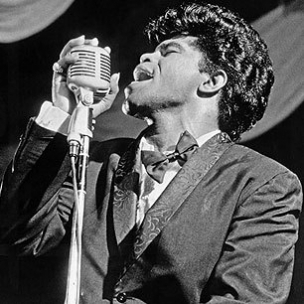 “I was just telling it like it is. Would you rather have someone tell you how they’re feeling to your face, or wait till you turn around and whisper their anger behind your back? You got to swing for the fences every time you’re at bat; you owe it to your children and grandchildren. That’s what I was doing, and I’ve always been about building, not destroying. I was there when Dr. King was assassinated, telling everyone to cool out, trying to remind everyone that you don’t want to destroy your country. You want to build it.”
“I was just telling it like it is. Would you rather have someone tell you how they’re feeling to your face, or wait till you turn around and whisper their anger behind your back? You got to swing for the fences every time you’re at bat; you owe it to your children and grandchildren. That’s what I was doing, and I’ve always been about building, not destroying. I was there when Dr. King was assassinated, telling everyone to cool out, trying to remind everyone that you don’t want to destroy your country. You want to build it.”
Nonetheless, notes Brown expert Harry Weinger, “That record lost him a big audience. From ‘65 to ‘68, he was extremely popular, with his audience getting wider and wider. Then he did this album and lost his white audience, and never had another top 10 single.”
What all these listeners were missing is the fact that whatever his politics, Brown’s music was just getting leaner and meaner, and ever funkier. The album Say It Loud, which was really a collection of singles recorded throughout ’68, also included the impossibly taught “Licking Stick” and the organ-driven instrumental “Shades of Brown.”
“Hey, that was just continuing what I started a few years back when I changed the music from being on the 2 and 4, where it had always been to the 1 and changing the emphasis from the downbeat to the upbeat,” Brown says. “That’s what created funk music – gospel and jazz mixed together by James Brown with a little help from God. And I just kept doing it and innovating it, right on through ‘Say It Loud’ and further.”
The single and most of the album also feature the distinctive sound of Brown’s backing band, the JB’s featuring guitarist Jimmy Nolen, generally credited as a major funk innovator. Brown says Nolen was great, all right, but he really wasn’t all that original.
“Sometimes ignorance is bliss,” Brown says. “Jimmy Nolen was a man who could play anything I wanted him to play and didn’t know enough to play anything but what I wanted. And that’s what made him great on ‘Say It Loud’ and everything else.”
// ]]>
Amazon.com Widgets
August 26, 2014
RIP Brian Farmer, another good man gone too soon.
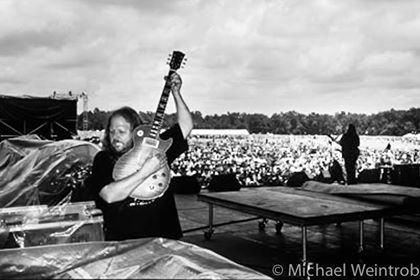
This photo by Michael Weintrob says it all. Farmer working so Warren could do his thing without ever thinking twice about anything gear related.
Warren Haynes’ longtime and much beloved guitar tech Brian Farmer died Sunday August 24, at his home near Nashville. Farmer died peacefully in his sleep. He was 53.
“He was a close friend, a devoted worker, and a lover of life,” says Haynes. “We traveled around the world together and shared many experiences-mostly while laughing. He will be missed by a huge circle of friends and family.”
Brian Farmer was extraordinarily dedicated to his craft, to the world of guitars and amps, to Warren and all his projects – and to the music itself. People like Brian keep the wheels turning and the gears greased and the guitars in tune. The shows don’t happen without them – and no one did any of this better, with more dedication, heart and soul than Farmer.
Farmer began working for Gov’t Mule in 1998, brought to the band by his old friend, bassist Allen Woody, who died almost exactly 14 years earlier. Prior to joining the Mule crew, Farmer worked for Johnny Cash for eight years before the Man in Black retired from touring. Farmer was exceedingly proud of his close relationship with Johnny and June Carter Cash.
“When Johnny retired, I ran into Allen and said, ‘You need to hire me, you need to hire me,’ Farmer told Hittin the Note magazine.
Months later, Gov’t Mule needed a guitar tech and Woody called his old friend. In the subsequent years, Farmer became an indispensable part of the operation, teching Warren Haynes’ guitars and also serving as the band’s equipment manager and stage manager.
Farmer has been by Haynes’ side for every gig the busy guitarist has played since 1998 – with Gov’t Mule, the Allman Brothers Band, the Warren Haynes Band, the Dead, Phil and Friends and others.
Farmer and Haynes developed an extremely close working relationship.
“We have looks that we give each other,” Farmer told Hittin the Note. “An eyebrow, a flick of the wrist… a shrug of his shoulders …I’ve learned to listen for things. I can tell sometimes when he’s close to breaking a string. With the Mule, I sometimes come out to adjust his amplifier before during and after songs.”
“He was one of a kind,” says Haynes. “He lived and breathed his job. He knew a lot more about guitars and gear than I did so I could trust him to keep things working in a technical manner so I could concentrate on the music.”

Farmer at Wake Up With Warren, Peach Fest 2014 – Sunday, August 17. Photo by Derek McCabe.
Says Allman Brothers Band manager Bert Holman, ”Brian was a very dedicated, very loyal, very skilled technician. He was from the old school and would help anybody and everybody do their job. If something of Derek or Gregg’s blew up, he’d be the first guy to grab a flashlight or tool and run across the stage because he was a team player. His standard line to any request was, ‘Just tell me what you need.’ Brian always had your back. He was kind to the fans and tried to give them as much time as he could without taking his eyes off the ball, which he never, ever did.”
Farmer also had a very close relationship with the Gibson Custom Shop, working with them on all of Haynes’ custom guitars.
“Brian was more than a visitor to Gibson Custom,” says Rick Gembar, Gibson Senior Vice President and General Manager of the Custom Division. “We were blessed to get to know him over the years as he came and went on behalf of Warren. During those years, he built relationships with everyone, from the front desk to the craftspeople, to me personally. He was a friend, well respected as a technician and genuinely admired for his kindness as much as for his tireless work ethic and attention to detail. Seeing him come through the door was always a welcome sight to the people here.
On behalf of everyone here at Gibson Custom, I send our deepest condolences to his family, Warren, Brian’s friends and all others that he touched during his time.”
Farmer’s death was greeted with shock and grief across the internet by fans and musicians alike. It is hard to imagine many other rock and roll road crew members who were more respected and beloved. Among those expressing their sorrow and respect on Twitter were Phil Lesh – “Fare thee well, Farmer – I love you more than can words can tell” and Derek Trucks.
The latter summed things up beautifully in a series of #ThankYouFarmer tweets: “People like Brian Farmer are the backbone of all live music. Without the hard work of folks like Farmer we’d be lost.”
August 23, 2014
An interview with John Fogerty
 I interviewed John Fogerty last year for the Wall Street Journal in advance of three shows he played at the Beacon. We spoke a lot longer than I could come close to capturing in that piece. A more extensive Q&A ran in Hittin the Note magazine. Here it is .
I interviewed John Fogerty last year for the Wall Street Journal in advance of three shows he played at the Beacon. We spoke a lot longer than I could come close to capturing in that piece. A more extensive Q&A ran in Hittin the Note magazine. Here it is .
••
It’s a bit overwhelming to see John Fogerty in concert and realize just how many hits and truly classic tunes the singer/songwriter/ guitarist wrote for Creedence Clearwater Revival. “Proud Mary,” “Who’ll Stop the Rain,” “Fortunate Son” and “Born on the Bayou” are just the start of what feels like an endless stream. The group released five hit-laden albums in three incredibly productive years, before sputtering, then breaking up acrimoniously in 1972.
Fogerty doesn’t jam per se; he recreates the song’s original versions, with both his voice and guitar sounding remarkably similar 40-plus years later.
Just hearing Fogerty perform these great tunes is a treat; for 25 years he refused to do so in public, embittered by lawsuits and the fact that he no longer owned the rights to his work. He resumed singing the songs in 1997 and on his recent tour, he played the albums Bayou Country and Cosmo’s Factory.
Fogerty’s most recent release was Wrote A Song For Everyone, featuring him re-creating some of CCR’s many hits with a variety of guest artists, from Jennifer Hudson to Bob Seger, Brad Paisley to Kid Rock. We spoke on the phone as his tour bus rolled through Virginia.
AP: You avoided playing the Creedence songs because you did not own the publishing and were involved in a lot of rights and suits over them. Has anything changed in your situation with those tunes?
FOGERTY: Not really. I don’t own the songs. At this point Concord Records, which bought Fantasy Records, own these songs. I do feel that I’m getting much fairer payment than I did while Fantasy was owned by Saul Zaentz, so that’s an improvement. I sure wish I had some better advice when I was quite young, but by the time I actually figured out what was up, it was too late. We had already signed all the contracts. Certainly at that time in that place, no one was going to do the right thing. Sometimes I look back at that and in the long run, I think they were incredibly shortsighted and maybe even stupid to have someone with that much talent and productivity under your wing and then alienate him in such a way that he never wanted to walk back in the building again, thereby losing whatever great music might have been made over the next 30 or 40 years. I think they just abandoned what was really working for our group. They insisted on going far away from that and basically destroyed the product.
AP: I just wrote a book on the Allman Brothers Band and as you probably know, they had a very similar deal with Capricorn Records, who had their label, management and publishing in one place.
FOGERTY: Yes, sadly we were not that unique in these regards. I’d really like to read that book, by the way. I am, of course, a big fan of the Allmans, one of the great bands
AP: You went about 25 years refusing to play your own CCR songs. Do you feel like you’ve reclaimed them, and a part of yourself and your own heritage?
FOGERTY: Yes, very much so. I started playing them again in 1997 on my Blue Moon Swamp tour. By then I had well made up my mind to start playing them again and was really ready to go.
It all came about back in 1990. I had taken a few trips to Mississippi. I thought I was figuring out the blues legends’ family trees, visiting the important sites of the great guys I grew up with: Muddy Waters, Howlin’ Wolf, John Lee Hooker, and so many other great people.
I was at the purported grave of Robert Johnson, sitting in the very hot, humid Mississippi sun and communing with him. Robert was an unlikely pop star at that moment, with a hit album. Columbia had released a box set of his songs and it had become a big hit, with a lot of literature, and the one photo of him that was known at that time. I was having a conversation with myself, wondering who owns Robert’s songs? And I got this image in my head of a shyster lawyer with a big cigar sitting in a tall building making all this money off the man’s work.
I was disgusted by that and in my mind, sticking up for Robert Johnson, I said to him, “It doesn’t matter, Robert. The whole world knows these are your songs. No one can take that away from you.” And I had what I later learned was called an epiphany. I realized this was exactly my own predicament I was describing perfectly. I was having a silent conversation in my mind and I realized it’s the same situation. And in that flash of insight, I said to myself, “John, this is you. You need to start playing your songs again before you’re laying in the ground like Robert here.”
It was such an amazing transformation of my mindset, because I had certainly vowed that I would never play these songs again. But you know how that goes: I had created my own Gordian knot and my mind was chained to that thought and my own pride would not let me go back on my own word. But in that one instantaneous moment there in the presence of Robert Johnson, I sort of found my way through to the other side of that whole thing. That’s when I decided that I would start playing my own songs again.
AP: But that was 1990. It still took seven years until you started playing them.
FOGERTY: Yeah, because I was still working on an album. It was a long, difficult trail until I got it all figured out and the album was released and I was ready to tour.
I’ll tell you something kind of strange. Whenever I told anyone about this trip to Mississippi, I started by explaining that I was going to rectify the blues family tree. Then Warner Bros records wanted info to create a bio and I was talking to the guy explaining the story I just related, and I said I made these trips and at the grave of Robert Johnson I had this epiphany and realized I needed to play my songs again. And something just hit me and I probably literally turned white because for the first time my brain realized that was the real purpose of going to Mississippi.
I had been directed, somewhat manipulated by my own unconscious mind, to find my way there so that I could make the realization that I had to start playing my own songs again. And when something like that happens that you hadn’t realized it’s kind of intense.
AP: And it’s interesting that this epiphany happened in Mississippi because so many people always thought you were from there or from Louisiana, because of the overall sound and songs like “Born on the Bayou.”
FOGERTY: Yeah, I still get that. A lot of people will tell me they thought I was from down there, and some will even say things like, “I was living down in Thibidoux and we all thought you were from Lake Charles because no one knew y’all.” That always makes me grin. It’s so well known about me at this point that most people know they were fooled at some point, or had a misunderstanding.
AP: You recorded five incredible albums in two years, six in three years, three in one year. How do you explain that pace, which is frankly hard to fathom?
FOGERTY: I was really driving myself I have to say. I guess I had a point in my career, shortly after “Suzy Que” was on the radio where I was taking stock. There was such an intense phenomena of the one hit wonder, or sophomore jinx and I was pondering to avoid that.
I had put so much life in my music, I didn’t wan that happen to me, so I took stock and said to myself, “I’m on a tiny, tiny label. We don’t really have a manager. We don’t have a publicist. We don’t have any big money behind us. I guess I’m just going to have to do it with music.” My idea was to create as much good music as I could to try and overcome all these other things I perceived to be flaws in our makeup. You would look at someone like the Stones or the Beatles. They had so much momentum behind them with the label and the management and everything else. How was I going to match that, which I was determined to do?
AP: And you did it, throwing songs out to match these guys from your little label in Oakland.
FOGERTY: Now it seems certainly precocious to even think you could do it, but I really drove myself. At all times, I was thinking about writing new songs and making new records. I was just pushing myself and pushing myself. My method was all about showing the other guys the music I was creating to the point of creating the arrangements. It needed to be done. It wasn’t much of a democracy at that point because I had a pretty clear vision of what needed to be done and there wasn’t a lot of time to be taking a quorum or votes: “Is this a good song or not?”
AP: Last year at the Lock’n Festival, you played with Widespread Panic. It was wonderful to watch your smile when the great Jimmy Herring started soloing. Was that whole experience as much fun as it appeared to be for you?
FOGERTY: I was a fan of Jimmy Herring’s and knew of Widespread Panic, but I didn’t know a lot about them. When we got together and rehearsed the day before the show, I was moved. I really loved it. I was certainly aware of the jam bands phenomenon. Actually, way, way back when I was sort of leading the charge with Creedence, I grew up in the Bay Area, so the psychedelic movement was in my backyard and it was certainly the impetus for things like “Heard It through the Grapevine,” “Suzy Que” and “Ramble Tamble.”
It’s really much more fluid and fun than I had remembered when a band has really good musicians. And being at the event, the festival itself… Gosh, there’s no way to describe it, but the records don’t really capture it. I really enjoyed listening to Widespread, even without me – not just playing with them.
And I got to hear Trey Anastasio’s set, with his solo band. I didn’t quite take Phish that seriously. I had bought a few CDs but not seen them live and I really wasn’t getting what was going on. I sat in the backstage area listening to Trey and, man, what a great guitar player. It was so much fun and I got it immediately – why people really like them. I used to think they were a lot of potheads, like the Grateful Dead and think they didn’t really know what was going on, that they were all hallucinating. I would say something like that, but having heard it in the flesh, man, it was really startling. Really great music… really vibe-y, I guess would say. I enjoyed it immensely. It was a bit of a revelation, actually.
AP: Jimmy is incredible. As he was taking off, you’re smiling and he starts to pull back and you nod, clearly saying, “Go on.”
FOGERTY: Oh yeah! He was just trying to be a gracious host I think and I was enjoying his playing so much and saying, “Don’t stop!”
AP: You mentioned growing up in the backyard of psychedelia, but your approach was quite different. Did you feel competition with bands like the Grateful Dead and the Jefferson Airplane?
FOGERTY: Not at all. I really liked those bands. I felt that politically or aesthetically, I was absolutely on the same page as them. I was pretty liberal. I grew up under the wing of Pete Seeger and believed in the ethics of rock and roll. There were a lot of philosophical traits I shared with the Dead, Airplane, Quicksilver. We were all young and we were all musicians in bands, which comes with a unique sort of kinship.
Some of the things I didn’t identify with were the really long guitar solos. I remember going to a concert at the Fillmore and watching one of the bands go into a guitar solo at the beginning of the set that lasted until the end of the set. And I couldn’t relate to that. It was boring. I grew up going to shows at the Oakland Auditorium seeing people like James Brown, B.B. King, Hank Ballard. They played short and snappy songs and then they’d go into another song right away. There seemed to be a work ethic that was to entertain the audience and keep it flowing, keep it interesting, keep changing, and I liked that.
Whereas some of the psychedelic bands I thought were pretty self-indulgent. I was at odds with that part. I had grown up with so much of the first wave of rock and roll and a lot of those show business secrets really resonated with me. A young James Brown would come out and play 14 hits in a row all while dancing and creating mayhem. I thought that was the way to go.
AP: That was to me the big difference between the San Francisco bands and the Allman Brothers, who would play the long solos without losing thread of the song.
FOGERTY: Yeah, that seems honest to me. I know that in listening to psychedelic music, there were times that I felt that the attention had wandered off somewhere and that did not happen in the Allman Brothers’ music. I’m a big fan.
AP: A few years ago you seemed open to reuniting with your CCR mates, but that now seems to be just something that will never happen.
FOGERTY: Yeah, I would say that’s probably true. Years ago I was still bitter and angry about everything that had come down. At one point I went to a shrink to try and get this stuff sorted out, and his word was “betrayal.” He said, “They betrayed you, John.” That insight was a step on the way to my healing. Years ago I was bitter and angry but now I’m not. I’m pretty mellow about the whole thing, actually.
What you’re talking about, about being open to a reunion… A writer had asked me what I though about a reunion and I said it was possible. It wasn’t something that I was planning or pushing but I didn’t react like I used to, which was “Never!” I hadn’t thought about it a lot or made a plan. I just gave an honest answer in the moment and realized this might mean to me it’s a possibility. I guess the other fellows read that and immediately got in the press and said, “This is John pulling a publicity stunt and we want nothing to do with it.” I said to my wife, “I guess they’re still angry” and that was that.
AP: Can you give a basic summary of why you feel they betrayed you? Did they take Saul Zaentz’s side in your disputes?
FOGERTY: That was a big part of it. There were quite a few incidences where that happened. I rather famously got sued for sounding like myself, when Zaentz contended that “The Old Man Down the Road” [Centerfield] sounded like “Run Through The Jungle.” That all started because [bassist] Stu Cook went to see Saul with a copy of Centerfield and played it for him and Stu’s quote at the time was “John is ripping off Creedence. You should sue him.” I actually ended up in court over this and heard Saul say that sentence. That was one of the ways I felt betrayed.
AP: Did recording all those songs with so many different people lead you to re-imagine any of the tunes? Did any of the collaborators’ take on them make you approach them differently?
FOGERTY: That was something I encouraged actually. I wanted things to be fresh. I told each artist, “I don’t want to just redo the old record I made. The world doesn’t really need that.” I encouraged each artist to have a different take. My wife said I was supplying the overall guidance.
I wanted each artist to imagine how this song sounded with them doing it and I think we managed to come up with a lot of new interpretations, which I was really happy about. Any musician loves to play and you get to be creating something fresh and new. Most of them are songwriters and also play an instrument so it’s second nature. It allowed a lot of the personalities of that artist to come through in our collaboration.
AP: Were you surprised at any point to realize how much influence your music had on country music?
FOGERTY: I suppose so. I do hear that all the time. A lot of people talk about the phenomenon but I didn’t realize it was as important or deep as it was until I did some of these sessions. I had Miranda Lambert telling me that with their band, long before she had a record contract, played a bunch of my songs, including “Traveling Band” and a bunch of others. Brad Paisley told me when he was a little kid he played “Centerfield” at some big jamboree in front of 20,000 people. He said he changed the key to E and turned it into a Tele song. And he said that even when he was a kid, his voice was lower than mine.
AP: You had a very old sounding voice when you were young, and it sounds remarkably the same today. Does it feel like you’ve grown into it? Have you had you change your approach as you’ve aged?
FOGERTY: I’ve thought about that. There were times that I thank my lucky stars that I just did what I felt in my heart should be the music that defines me. A lot of things that seem apropos when you’re 19 or 20 will look pretty damn foolish when you’re 40 or 50. I’m glad I don’t have to go out on stage and do anything that I’m embarrassed or even ashamed about. There are some areas of music or presentation or dress that would be embarrassing to have to recreate when you’re older.
AP: But a flannel shirt will never look foolish!
Your son Shayne is now playing guitar in your band. Dickey Betts and Phil Lesh also have sons in their bands. As an audience member, I enjoy seeing these interactions. How is it for you?
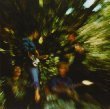

FOGERTY: Are you kidding? It’s the greatest thing in the world. I’ve had both of my sons come and play for the last 5 years or so, but they would only do one or two songs. Now Shayne is a member of the band and it’s always a highlight of the show for me when he plays a solo.
I realize that as a professional putting on a show there are certain precepts you adhere to: having a tight setlist, being well rehearsed and in tune. Those are things you do for the audience but the moments when Shayne and I are rocking out together it’s special in a different way and it’s hard to describe, but I think most people who have kids will understand. In some way rocks and roll has always been a thing of rebelling, outside the law in some respects and to come full circle and have it be family values time is very special to me.
AP: You have a written quite a stream of fantastic songs, but I have to give special props to “Fortunate Son,” one of the angriest, most cogent pieces of writing about privilege and hypocrisy I’ve ever heard in any form. You really said a lot in a relative few words, expressing thoughts and emotions that far transcend rock and roll. Can you discuss the origin of the song a bit?
FOGERTY: Thanks. The concept of “Fortunate Son” came about in a fairly normal writerly way. I noticed during political conventions that people would name a certain senator and call him “the famous son of the State of Texas.” They used that phrase a lot. This was 1969 or 70, the height of the Vietnam war experience, and I was very angry about that situation. The idea that number one we were fighting this war that seemed so absolutely cockeyed and number two that older people had no compunction about sending younger people off to be killed for this vision of theirs – as long as they were other people’s sons. Not theirs or their friends’ fortunate sons.
My absolute anger over the Nixon white house for propagating the war policy was driving me. They also had gotten very paranoid, as we saw in Watergate a bit later. Those people were cuckoo, kind of in a sick mental place really, insisting on hearing no other options from anybody else.
I knew I had a song called “Fortunate Son” and I knew what it was about. We would rehearse those songs for probably six weeks before we went to a studio play them, just day after day working them out. This one was written musically with no lyrics, just a title and a concept. I could see we were getting pretty close and at some point I said to myself, “You have to sit down and write the words and give it a voice.” I went into my bedroom with a legal pad, sat down on the edge of the bed and just wrote it all out in one exhale. It was probably the quickest song I’ve ever written because it had been percolating.

AP: So you had a concept, but had you thought through how you would structure the song?
FOGERTY: Not really. I didn’t know it would follow the course of the chorus “It ain’t’ me” or naming this or that occupation and station in life. It just happened right then. It was absolutely my own feeling about these situations then and forever- the privileged people , the rich men have always started the wars and poor man have fought the wars.
I would see on TV all these senators whose own kids were safely ensconced in college and he was voting to keep the war going. It was absolutely my own very raw emotions about it. It seemed to be a very clear and very loud emotional statement; it’s not restrained at all. It’s pretty harsh and I think that’s what’s made it so meaningful. You can tell exactly what this guy is singing about. I was kind of calling those people out who were clearly feeling so full of themselves. “Fortunate Son” to me was pretty directly aimed at class privilege and calling these people out.
AP: You have been playing Bayou Country and Cosmo’s Factory complete on tour. Did that lead you to bring back songs you had not been playing?
FOGERTY: Yes. “Graveyard Train” and “Penthouse Pauper” from Bayou Country. Those are things I really hadn’t touched much in really over 40 years. It’s been a lot of fun introducing deep tracks and songs from other parts of my career. You get to a point where you focus on certain songs and miss out so many other great ones. Since we’re staying in one place, I hope to make each night quite different than the night before, shuffling the songs in the Deep Tracks category and making each night different.
AP: And I think because so many people know your great songs through Greatest Hits albums and the radio, many probably have forgotten some of these great album tracks.
FOGERTY: Yes, it’s really fun reintroducing them. And it’s really a lot of fun playing both those songs. Now that we’ve done it quite a bit we’re getting used to it, but when I brought them out for the tour rehearsals, it was remarkable, really, to get back into these songs I wrote and recorded and had not touched in so long. It’s very refreshing and I’m also a little mystified with myself why I went so long without doing them, to tell you the truth.
AP: Well, anyone with as long of a career as you loses some great album tracks along the way, whether it’s the Rolling Stones or the Allman Brothers.
FOGERTY: Yes, that’s exactly right.
// ]]>
Amazon.com Widgets
August 10, 2014
The full text of Amazon’s George Orwell letter
 New York Times reporter David Streitfield has been covering the Amazon/Hachette dispute since it began. He has an interesting, humorous take on the latest development – a rather odd and clearly misguided George Orwell reference. Money quote:
New York Times reporter David Streitfield has been covering the Amazon/Hachette dispute since it began. He has an interesting, humorous take on the latest development – a rather odd and clearly misguided George Orwell reference. Money quote:
The retailer argues that people against e-books are against the future, and talks about how the book industry hated cheap paperbacks when they were introduced in the 1930s, and said they would ruin the business when they really rejuvenated it. Unfortunately, to clinch its argument it cites the wrong authority:
“The famous author George Orwell came out publicly and said about the new paperback format, if ‘publishers had any sense, they would combine against them and suppress them.’ Yes, George Orwell was suggesting collusion.”
Could the Amazon Books Team, which is credited as the source of this post, have really written this? Because a moment’s Googling would have revealed that the team is misrepresenting this “famous author.”
I’m sure some of you saw it. You probably have not seen what follows… the full letter from Amazon, which I received as a self-published author (One Way Out began as an Ebook.) I thought it would be of interest to some. Writer Bob Lefsetz also has an interesting take on the issue – check it out here.
_____________________________
Dear KDP Author,
Just ahead of World War II, there was a radical invention that shook the foundations of book publishing. It was the paperback book. This was a time when movie tickets cost 10 or 20 cents, and books cost $2.50. The new paperback cost 25 cents – it was ten times cheaper. Readers loved the paperback and millions of copies were sold in just the first year.
With it being so inexpensive and with so many more people able to afford to buy and read books, you would think the literary establishment of the day would have celebrated the invention of the paperback, yes? Nope. Instead, they dug in and circled the wagons. They believed low cost paperbacks would destroy literary culture and harm the industry (not to mention their own bank accounts). Many bookstores refused to stock them, and the early paperback publishers had to use unconventional methods of distribution – places like newsstands and drugstores. The famous author George Orwell came out publicly and said about the new paperback format, if “publishers had any sense, they would combine against them and suppress them.” Yes, George Orwell was suggesting collusion.
Well… history doesn’t repeat itself, but it does rhyme.
Fast forward to today, and it’s the e-book’s turn to be opposed by the literary establishment. Amazon and Hachette – a big US publisher and part of a $10 billion media conglomerate – are in the middle of a business dispute about e-books. We want lower e-book prices. Hachette does not. Many e-books are being released at $14.99 and even $19.99. That is unjustifiably high for an e-book. With an e-book, there’s no printing, no over-printing, no need to forecast, no returns, no lost sales due to out of stock, no warehousing costs, no transportation costs, and there is no secondary market – e-books cannot be resold as used books. E-books can and should be less expensive.
Perhaps channeling Orwell’s decades old suggestion, Hachette has already been caught illegally colluding with its competitors to raise e-book prices. So far those parties have paid $166 million in penalties and restitution. Colluding with its competitors to raise prices wasn’t only illegal, it was also highly disrespectful to Hachette’s readers.
The fact is many established incumbents in the industry have taken the position that lower e-book prices will “devalue books” and hurt “Arts and Letters.” They’re wrong. Just as paperbacks did not destroy book culture despite being ten times cheaper, neither will e-books. On the contrary, paperbacks ended up rejuvenating the book industry and making it stronger. The same will happen with e-books.
Many inside the echo-chamber of the industry often draw the box too small. They think books only compete against books. But in reality, books compete against mobile games, television, movies, Facebook, blogs, free news sites and more. If we want a healthy reading culture, we have to work hard to be sure books actually are competitive against these other media types, and a big part of that is working hard to make books less expensive.
Moreover, e-books are highly price elastic. This means that when the price goes down, customers buy much more. We’ve quantified the price elasticity of e-books from repeated measurements across many titles. For every copy an e-book would sell at $14.99, it would sell 1.74 copies if priced at $9.99. So, for example, if customers would buy 100,000 copies of a particular e-book at $14.99, then customers would buy 174,000 copies of that same e-book at $9.99. Total revenue at $14.99 would be $1,499,000. Total revenue at $9.99 is $1,738,000. The important thing to note here is that the lower price is good for all parties involved: the customer is paying 33% less and the author is getting a royalty check 16% larger and being read by an audience that’s 74% larger. The pie is simply bigger.
But when a thing has been done a certain way for a long time, resisting change can be a reflexive instinct, and the powerful interests of the status quo are hard to move. It was never in George Orwell’s interest to suppress paperback books – he was wrong about that.
And despite what some would have you believe, authors are not united on this issue. When the Authors Guild recently wrote on this, they titled their post: “Amazon-Hachette Debate Yields Diverse Opinions Among Authors” (the comments to this post are worth a read). A petition started by another group of authors and aimed at Hachette, titled “Stop Fighting Low Prices and Fair Wages,” garnered over 7,600 signatures. And there are myriad articles and posts, by authors and readers alike, supporting us in our effort to keep prices low and build a healthy reading culture. Author David Gaughran’s recent interview is another piece worth reading.
We recognize that writers reasonably want to be left out of a dispute between large companies. Some have suggested that we “just talk.” We tried that. Hachette spent three months stonewalling and only grudgingly began to even acknowledge our concerns when we took action to reduce sales of their titles in our store. Since then Amazon has made three separate offers to Hachette to take authors out of the middle. We first suggested that we (Amazon and Hachette) jointly make author royalties whole during the term of the dispute. Then we suggested that authors receive 100% of all sales of their titles until this dispute is resolved. Then we suggested that we would return to normal business operations if Amazon and Hachette’s normal share of revenue went to a literacy charity. But Hachette, and their parent company Lagardere, have quickly and repeatedly dismissed these offers even though e-books represent 1% of their revenues and they could easily agree to do so. They believe they get leverage from keeping their authors in the middle.
We will never give up our fight for reasonable e-book prices. We know making books more affordable is good for book culture. We’d like your help. Please email Hachette and copy us.
Hachette CEO, Michael Pietsch: Michael.Pietsch@hbgusa.com
Copy us at: readers-united@amazon.com
Please consider including these points:
- We have noted your illegal collusion. Please stop working so hard to overcharge for ebooks. They can and should be less expensive.
- Lowering e-book prices will help – not hurt – the reading culture, just like paperbacks did.
- Stop using your authors as leverage and accept one of Amazon’s offers to take them out of the middle.
- Especially if you’re an author yourself: Remind them that authors are not united on this issue.
Thanks for your support.
The Amazon Books Team
P.S. You can also find this letter at www.readersunited.com
August 7, 2014
Checking in with the North Mississippi All Stars
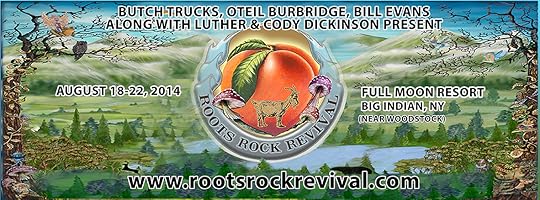 I’ll be hanging out with the Dickinson brothers in a couple of weeks at Butch Trucks’ Roots Rock Revival. Great guys, great band, great spirit. This story originally ran in Relix.
I’ll be hanging out with the Dickinson brothers in a couple of weeks at Butch Trucks’ Roots Rock Revival. Great guys, great band, great spirit. This story originally ran in Relix.

The Dickinson brothers.
It’s soundcheck at New Jersey’s South Orange Performing Arts Center and the North Mississippi All Stars are working out a new instrumental written by drummer Cody Dickinson, who is playing the gospel-tinged tune on a Nord keyboard set up on the perimeter of his kit. His brother Luther plays along with the changes on his Gibson 335 while Lightnin’ Malcolm leans against his amp and adds a loping, behind-the-beat bass line.
When they get lost for a moment and drop out, Cody keeps running through the changes, now calling them out: “It’s F to A flat to C – hold the C- back to F, G flat, F, E flat, hold the C, B Flat…”
As the band settles into the song, moving from hesitant to grooving, Luther adds some biting slide fills and smiles, as is his wont. “That’s nice,” he says. “What do you call it?”
“Hmmm…Let’s give it a working title: ‘Seeing Time.’”
Cody picks up a drumstick in his left hand and enhances the beat on a tom tom, as his right foot stomps the bass drum and his right hand continues to play the piano. The sketch is starting to sound like a song.
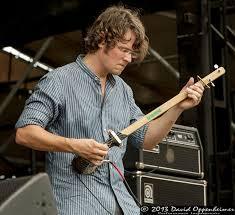 About 20 fans take in this scene, silently, reverently listening and watching. They paid extra for a VIP experience that allows them to meet the band and watch soundcheck and to a person they will say it was money well spent. This is an increasingly popular gambit by bands looking to strengthen their bonds with fans and improve their road take, and the All Stars are perfect candidates, because they genuinely enjoy interacting with people. They say that the experience has also been beneficial for the band, changing the way they soundcheck.
About 20 fans take in this scene, silently, reverently listening and watching. They paid extra for a VIP experience that allows them to meet the band and watch soundcheck and to a person they will say it was money well spent. This is an increasingly popular gambit by bands looking to strengthen their bonds with fans and improve their road take, and the All Stars are perfect candidates, because they genuinely enjoy interacting with people. They say that the experience has also been beneficial for the band, changing the way they soundcheck.
“I get full songs out of them now,” says soundman and longtime crewmember Randy Stinson.
“It makes us be a little more civil towards each other – and be more creative,” Luther says. “We can rehearse in front of an audience and I think that’s a plus. I was concerned about it hindering the creative process, but it has actually led us to come up with new segues and work up new material like the instrumental.
“You can get to a place and not feel like turning on and smiling, but the fans’ enthusiasm is infectious. You stagger in and someone smiles wide and shakes your hand and says, ‘I’m so happy to be here. I drove five hours to see you!’”
“That revitalizes your energy,” adds Cody. “It reminds you why you’re here, why you do this.”
Of course, the band probably drove at least five hours to see the fans as well, but that’s different. It’s their job, the life they’ve chosen. The life the Dickinsons were born into and embraced.
Cody and Luther’s father Jim Dickinson, who passed away in 2009, was a pianist and producer, a garage blues legend, best known for playing piano on the Rolling Stones’ “Wild Horses” and Bob Dylan’s Time Out of Mind and producing the likes of Big Star and the Replacements. As kids, Luther and Jim backed their father in the Hardly Can Playboys, before forming DDT, a punk band with a heavy Black Flag influence. At 14, Luther played a solo on the Replacements’ “Shooting Dirty Pool” from the 1987, Jim-produced Pleased to Meet Me.
About a year before that, the senior Dickinson had moved his family from the countryside East of Memphis to his old stomping grounds South of the city in the North Mississippi hills, with the express goal of furthering his boys’ musical education. It worked. Luther and Cody became close friends with the extended families of local blues patriarchs R.L. Burnside, Junior Kimbrough and Otha Turner, all of whose droning music –distinctly different than the better-known Mississippi Delta blues – seeped into the Dickinson boys’ souls.
In 1996, the brothers formed the North Mississippi All Stars, a group that pulled together all of these influences and debuted nationally with 2000’s Shake Hands With Shorty. That album distilled the magical, high-energy manner the brothers reinvigorated the blues with a raucous blast of fun that proved you could be reverential without being calcified. The group incorporated hip-hop beats and speed guitar runs without ever losing their blues grit and feeling. In the ensuing 13 years, they’ve added more and more elements and played with a rotating cast of bassists and other musicians. World Boogie Is Coming brings them full circle; it’s easily their most raw recording since Shorty.
“Our friend Seasick Steve knows our whole history and he said to me, ‘You’re the one, boy, the link,’” Luther recalls. “He said, ‘You have to keep it primitive and hold up your end of the bargain by taking it to the kids and making the blues attractive again.’ I realized I had not been holding up my end of the deal. The masters took me in and taught me so much – how to tour, how to keep the dance floor packed – and I had gotten caught up in my own songwriting trip.
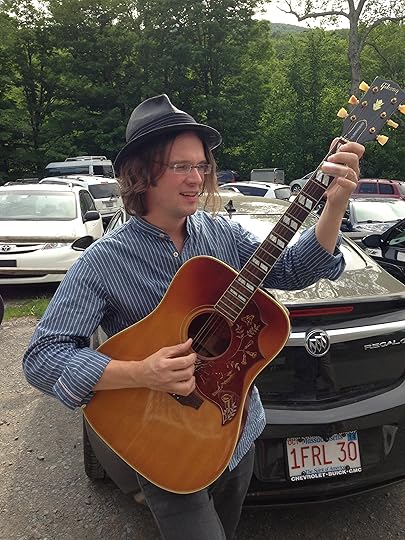
Luther playing a Humingbird that may have been Duane Allman’s – last year at Roots Rock Revival
“We’ve really learned how to put everything in their proper place. Doing solo records and projects has allowed me to streamline what the All Stars should be. If I have some folk songs, there’s no need to force them into the All Stars just because I wrote them.”
The first song they recorded for World Boogie was an updated version of the blues classic “Rollin’ and Tumblin’,” with Luther laying down the main riff on a two-string diddley bow.
“We were doing an in-store appearance in North Carolina and my friend handed me a homemade coffee can two-string diddley bow guitar and I just tuned it up started playing ‘Rollin’ and Tumblin’,’” Luther says with a laugh. “We liked the way it came out and recorded it at our home studio, which we call the Zebra Ranch Electric Church and Fellowship Hall.
“That was the start of this record, though we didn’t know it at the time. We released it as a single, and were thinking that that’s what we would do: release singles.”
The shift in focus began when Cody, who has a growing interest in photography, recorded a video for the song, and the process jump-started a desire to record a song cycle that would be a “complete cultural statement.” Cody eventually cut videos for four of the songs, which can be seen at www.nmallstars.com.
“I’m real big on progress,” Cody says. “I don’t want to be stuck or static. When I see something that’s dynamic, I get excited and that’s how we try to push forward.”
When the band hit the road again, they began screening Cody’s films behind them and they continued to expand their footage, bringing cameraman Shelby Baldock with them.
Recalls Luther, “He filmed some stuff for us and we said, ‘We’re leaving on tour tomorrow. You have to come with us.’ It adds so much.”
Baldock watches the band from the side of the stage and keeps the film running behind them well synced and ever creative, often including local footage shot that afternoon. The films present a mesmerizing backdrop.
“It really helps the audience’s attention span,” says Luther. “It doesn’t really influence me – I can’t see it. But I can feel how it influences the audience and the vibe. It keeps their eyes on us, on the stage.”
Adds Cody, “I got into photography and acting – I’ve been in GI Joe and some other films. I understood that we needed a visual element and I wanted to stay away from laser lights. I hate stage lights. They make me sweat and look bad, and the projections allow us to mostly play in the darkness and to give people the multi-sensory experience they are so used to having. I love that we’re projecting. We’re coming to the future, but in such an old school way that it’s really the past, which is just perfect for us.
“Not only does it add a new dimension but it tells a story – and it looks cool. For instance, in the song ‘All Night Long,’ the movie shows concrete steps and bushes and it looks cool, but it’s deeper than that – it’s Junior Kimbrough’s juke joint. Obviously, most people don’t know that, but I still think they feel it, that it adds to the vibe.”
The Dickinsons have been profoundly impacted by their interactions in recent years with a trio of musical titans: Robert Plant, whose Band of Joy they toured with in 2011, and who plays harmonica on World Boogie; Phil Lesh, who has had the brothers out to California to play with his Friends; and Butch Trucks, the Allman Brothers drummer with whom the Dickinsons worked at the Roots Rock Revival camp last summer.
“These guys are giants of rock and roll and they’ve become friends and role models,” says Luther. “Touring with Phil and Plant and getting the chance to see them up close has been incredibly inspiring and instructive. They work really, really hard with total dedication to the music.”
Cody jumps in: “It’s a serious business and they take it very seriously.”
Luther nods his head in agreement and continues. “We were on tour opening for Plant when he was just doing his first shows with the Band of Joy and he was putting them through the paces, really making them work and learn a wide repertoire, some of which they didn’t even play. I think he wanted them to have the same music under their fingertips.
“And what Phil does – flying all these musicians in, working all day learning songs and arrangements, then playing shows at night, then starting all over again with a new crew – requires an incredible amount of work, patience and dedication.”
Cody sits across from this brother on their bus, nodding in agreement. It’s after soundcheck and before show time and the brothers are feeling expansive as they relax.
“Phil Lesh is a master,” Cody says. “Hanging and playing with him was the gig of a lifetime, just a total pleasure. After I was done, I had a completely new perception of what we do. Now I walk on stage with no preconceptions of what things should sound like, or where we should go. It’s like performance art.”
Cody generally sings one song a night, and it’s generally a different song every night, an approach which working with Phil pushed him towards. “The point is I’m pushing myself and losing all preconceptions of what I can do,” he explains. “It’s more like performance art and less like regurgitating what l Iearned in jazz band.”
Cody pauses for a second before continuing: “The payback to dedicating your life to something as abstract as being a touring musician is getting to pay with a master like Phil or Robert – or to sit and play double drums with Butch Trucks,” Cody says. “These are guys with finely developed musical personalities and visions. We learn so much and have so much fun interacting with them.”
Adds Luther, “Playing with Phil and seeing his dedication to sharing his passion and very distinct musical approach reminded me a lot of my dad, who used to always say, ‘If you learn something, it’s your responsibility to pass it on.’ I think that’s exactly what Phil is doing.
Trucks, Lesh and Plant could not have found more willing protégés for their mentorships. The Dickinson brothers have spent their lifetime learning from and collaborating with their father as well as
Turner, Kimbrough, Burnside and other Mississippi elders. Now those mentors are all gone, and in some ways their deaths may have drawn the brothers closer, underlining the bonds they share.
Says Luther, “When Cody and I play together I often think that this is the closest thing left to playing with Dad, and I think about that when I’m trying to be musically sympathetic, which is the key to being a team player; it’s the key to everything. I always just try to get in the moment and make something happen, and it’s not about fancy work. It can’t be, because what I play keeps getting simpler and simpler.”
As we talk, bassist Lightnin’ Malcolm is on stage as the opening act, playing a duo show with single-named teenaged drummer Stud, the grandson of T Model Ford, who named the boy. Cody is pacing around and stretching, checking messages on his IPhone. Luther is reclining in the bunk of their bus, a Moleskin notebook in hand, poring through the pages, reading and making notes.
“This goes back to ’08 and has every setlist we’ve played,” he says. “I’m putting together a setlist and we never want to repeat songs we played last time in a place.”
 The brothers are growing more quiet and contemplative as show time draws nearer, until Malcolm and Stud bound back on the bus. Seen up close, Stud’s youth is disarming. I ask him how old he is and he quickly answers, “Old enough.” In an hour, he’ll be jumping on and off stage with the All Stars, often parading around with a strapped on snare drum, sometimes taking over the kit so Cody can strap on an electrified washboard or a Telecaster.
The brothers are growing more quiet and contemplative as show time draws nearer, until Malcolm and Stud bound back on the bus. Seen up close, Stud’s youth is disarming. I ask him how old he is and he quickly answers, “Old enough.” In an hour, he’ll be jumping on and off stage with the All Stars, often parading around with a strapped on snare drum, sometimes taking over the kit so Cody can strap on an electrified washboard or a Telecaster.
Malcolm has been playing bass with the All Stars for about a year, though they’ve known him for much longer. Like most things in the band’s realm, his joining happened organically.
“We live really close together and he began coming over to my Airstream for songwriting and jamming sessions,” Luther says. When founding bassist Chris Chew took a friendly hiatus, the band played with Pierre Wells and Alvin Youngblood Hart, before Malcolm came on board.
Chris Chew took a hiatus from the band mostly due to a desire for a steady paycheck. He is working as a truck and bus driver and remains in touch with the Dickinsons.
“Chew is healthy and happy!” says Luther. “We invited to join us on our fall tour and have Malcolm play second guitar, but he declined.”
“Hell, I don’t want to tell them this, but a lot of people could play what I do,” Malcolm says with a laugh. “I’m really a guitarist so when I play bass I just play half as many notes.”
“He brings a sensibility,” says Cody. “He knows the music and where we’re coming from, and we learn a lot from him, too.”
Luther and Cody exhibit a natural ease, like the music just flows through them. But it took a lot of effort to achieve that effortlessness, a lifetime of music being their lives, of incorporating their influences so deeply that they become one with them, of thinking, talking, eating, breathing music every day until it becomes inseparable from everything else.
“We know who we are and what we do,” Luther says with a smile, walking off the bus and heading for the stage door. It’s a Sunday night in suburban New Jersey and a theater full of people is waiting to hear some World Boogie.


